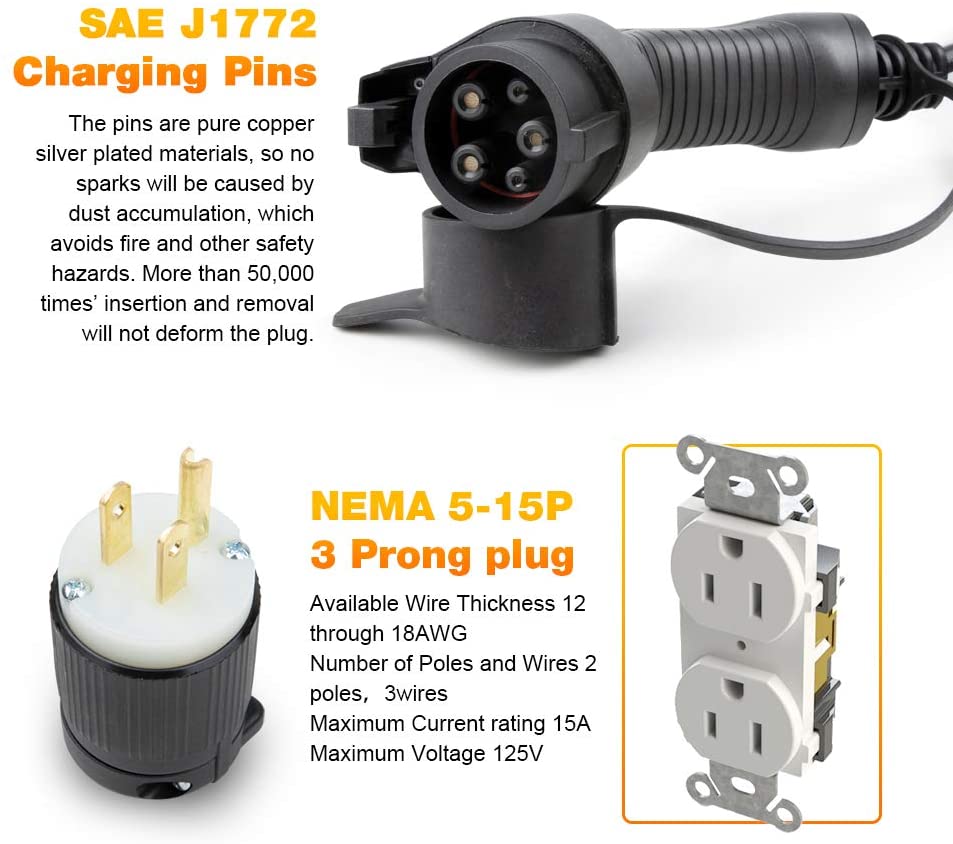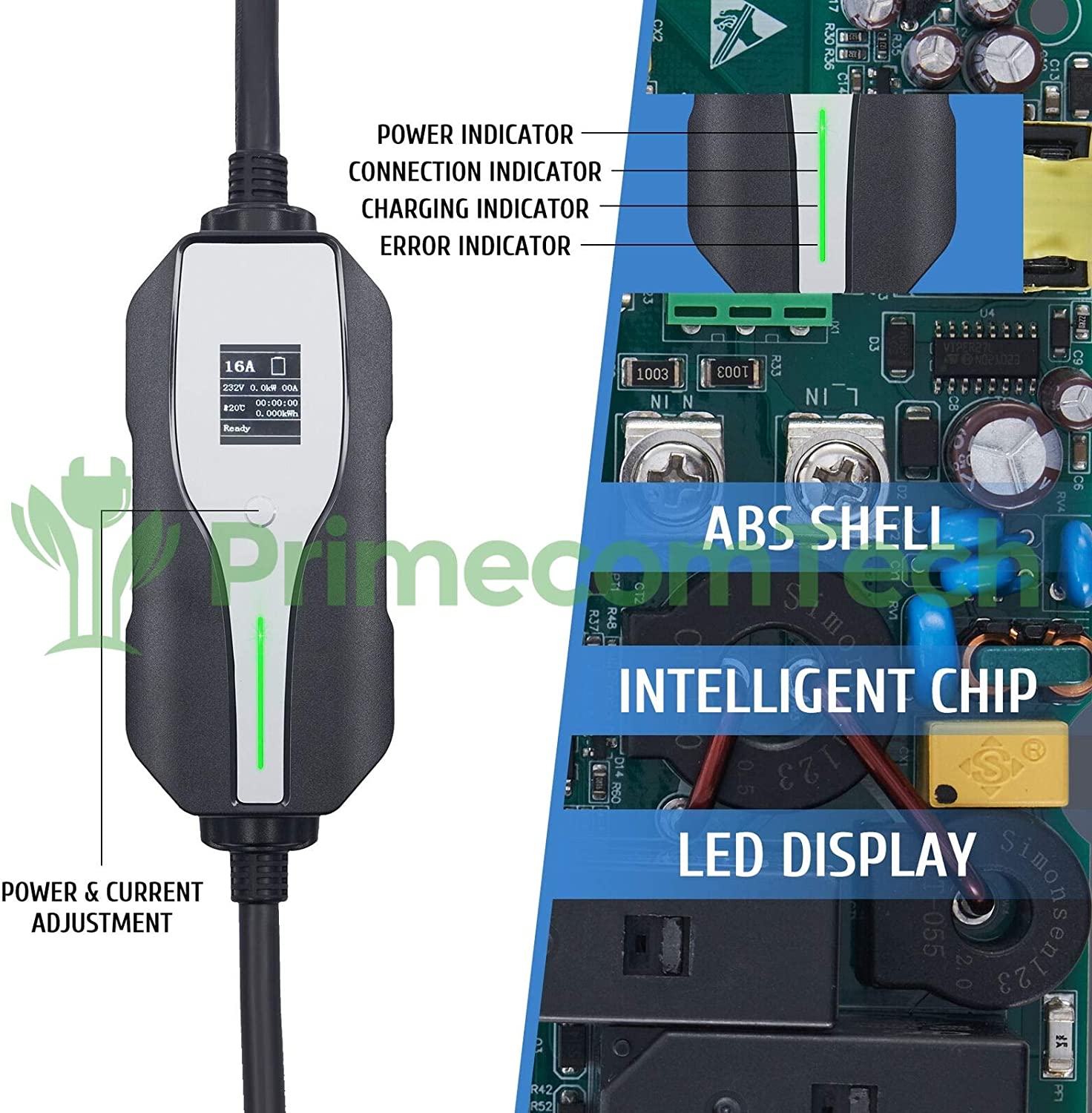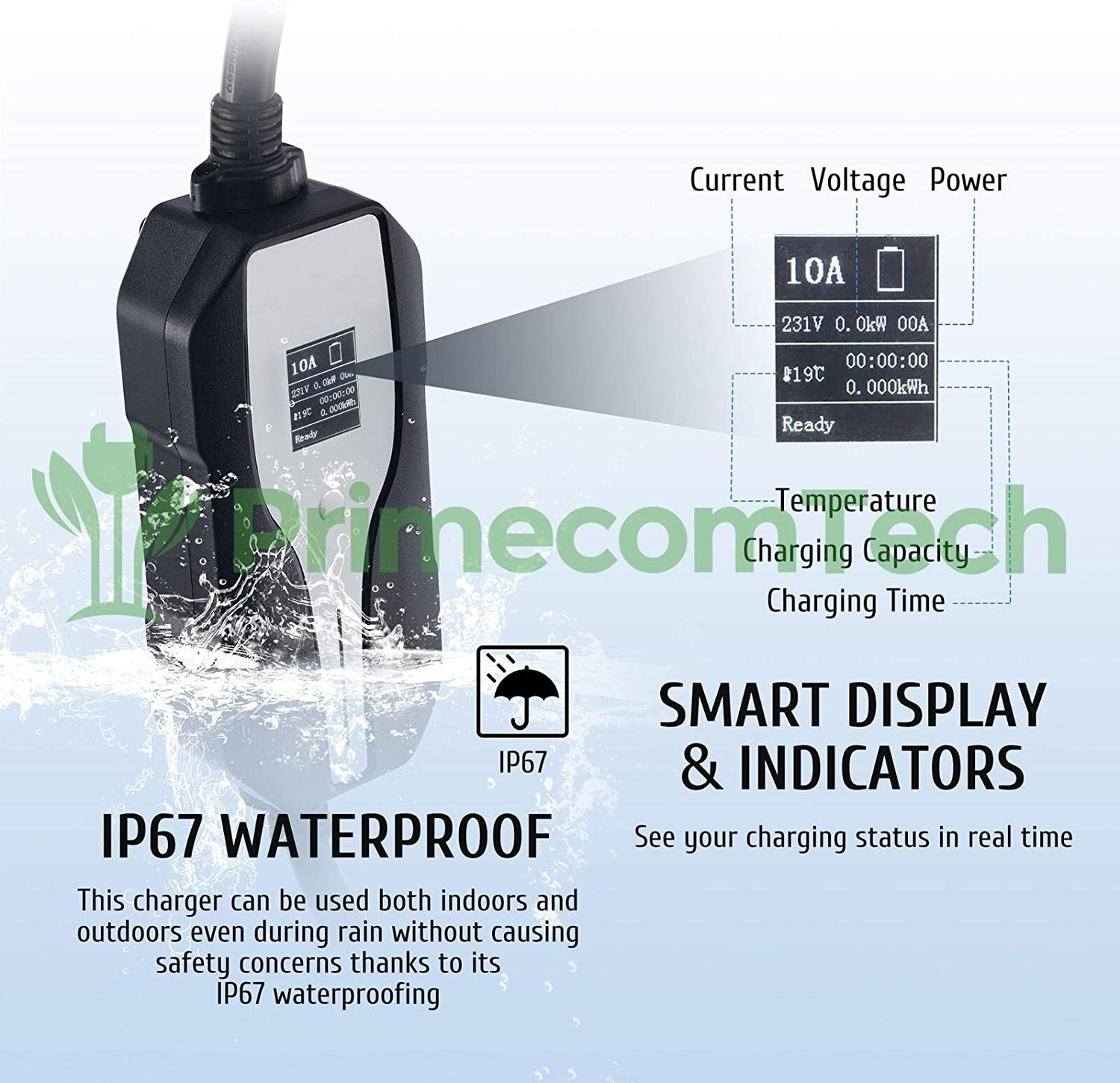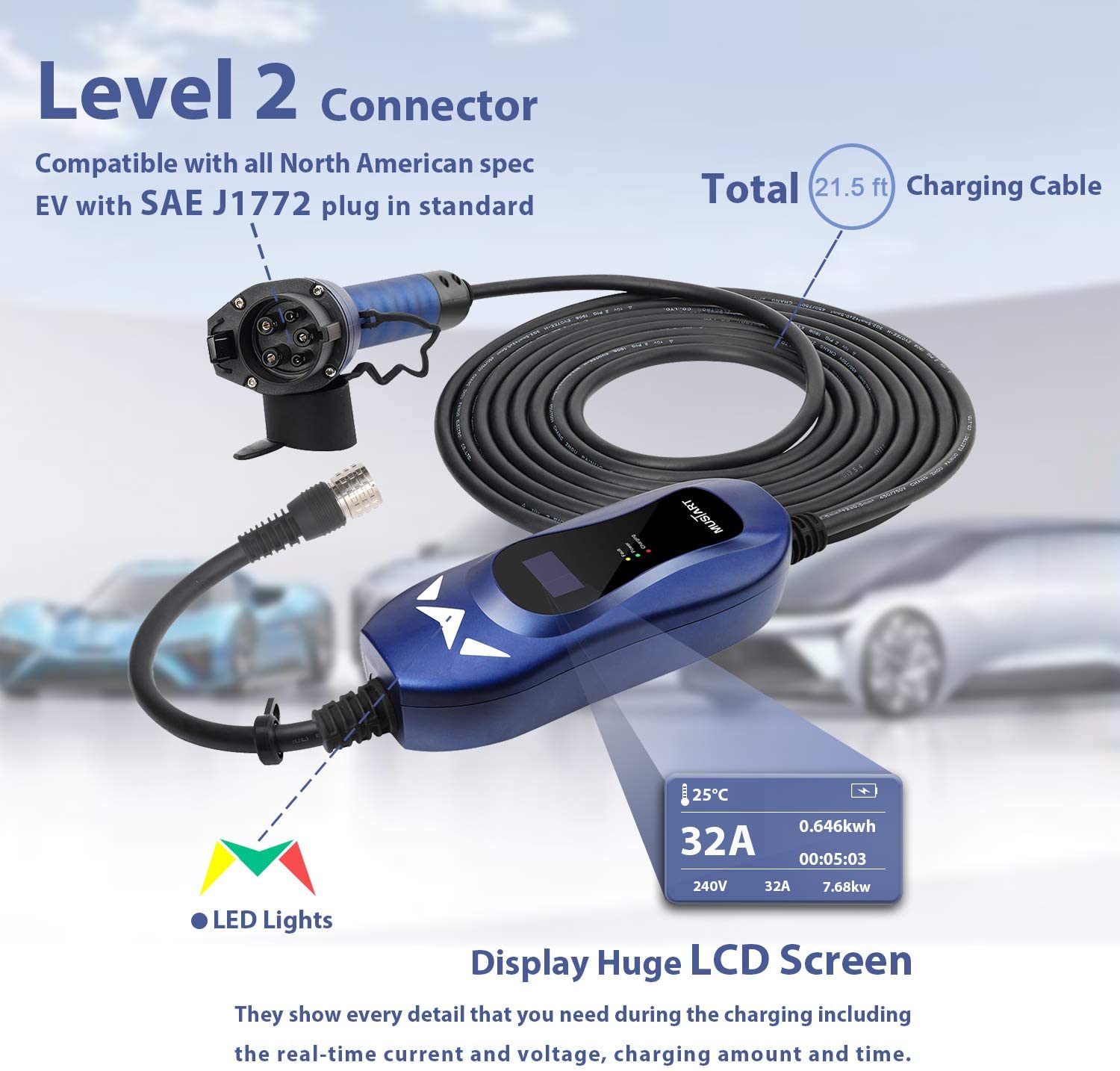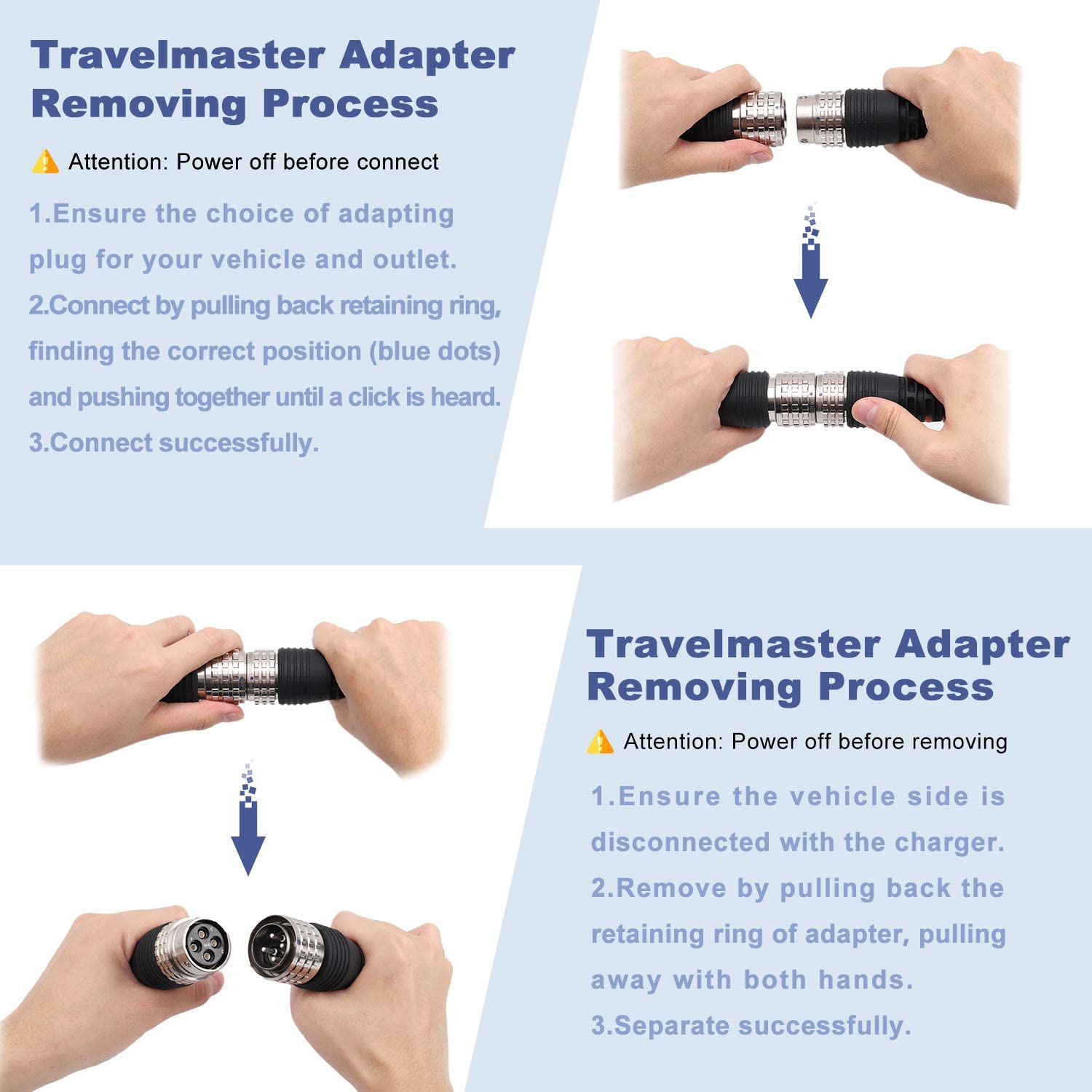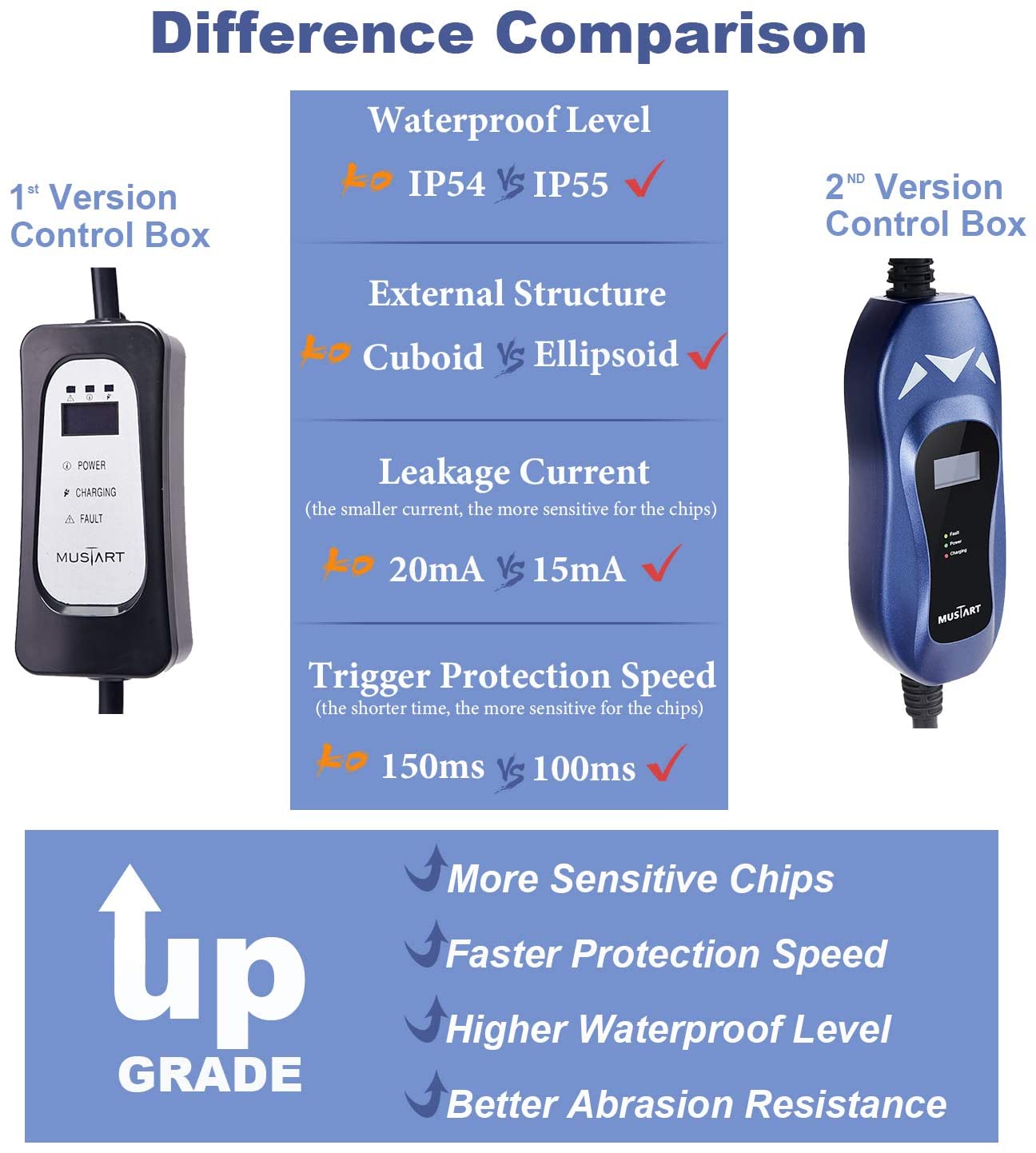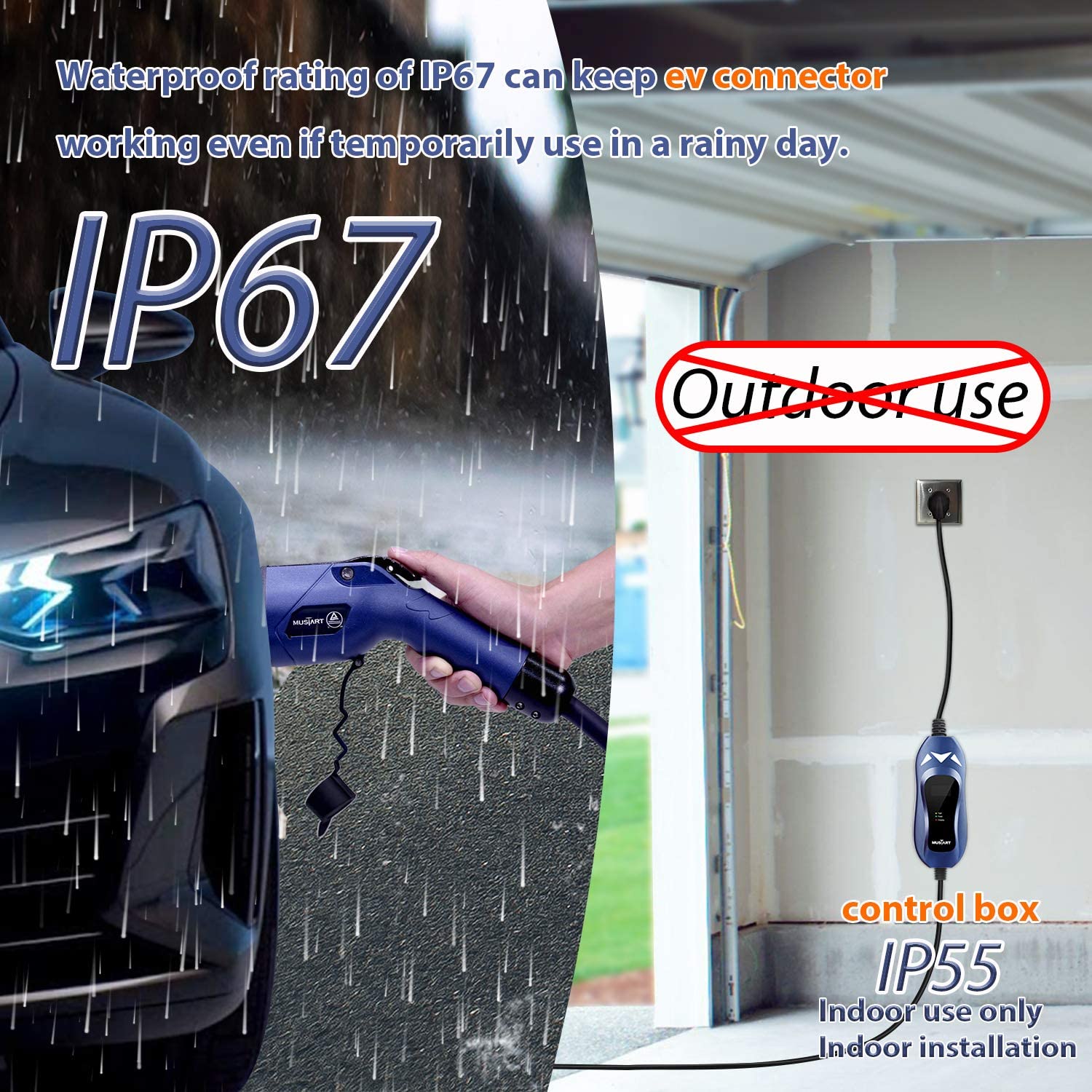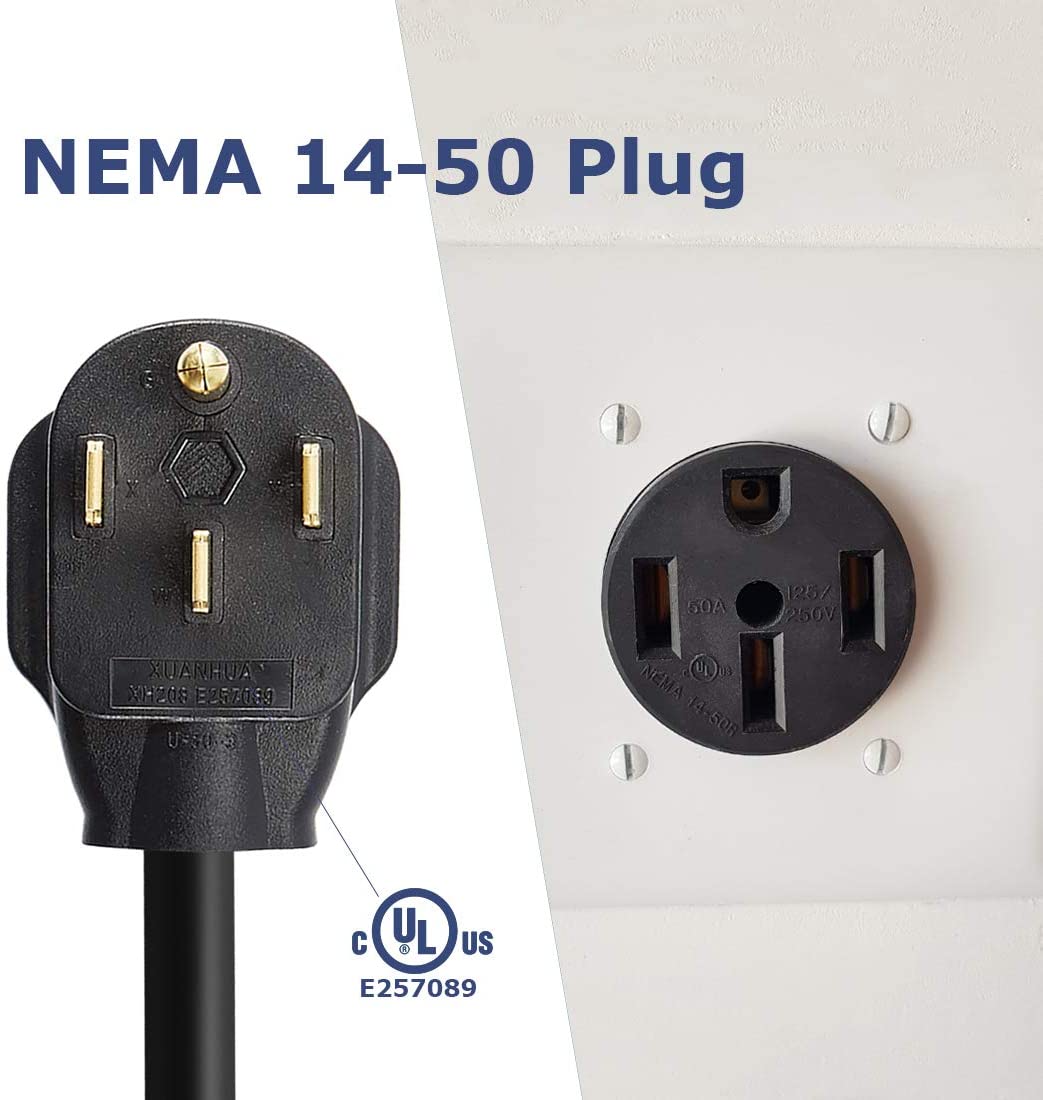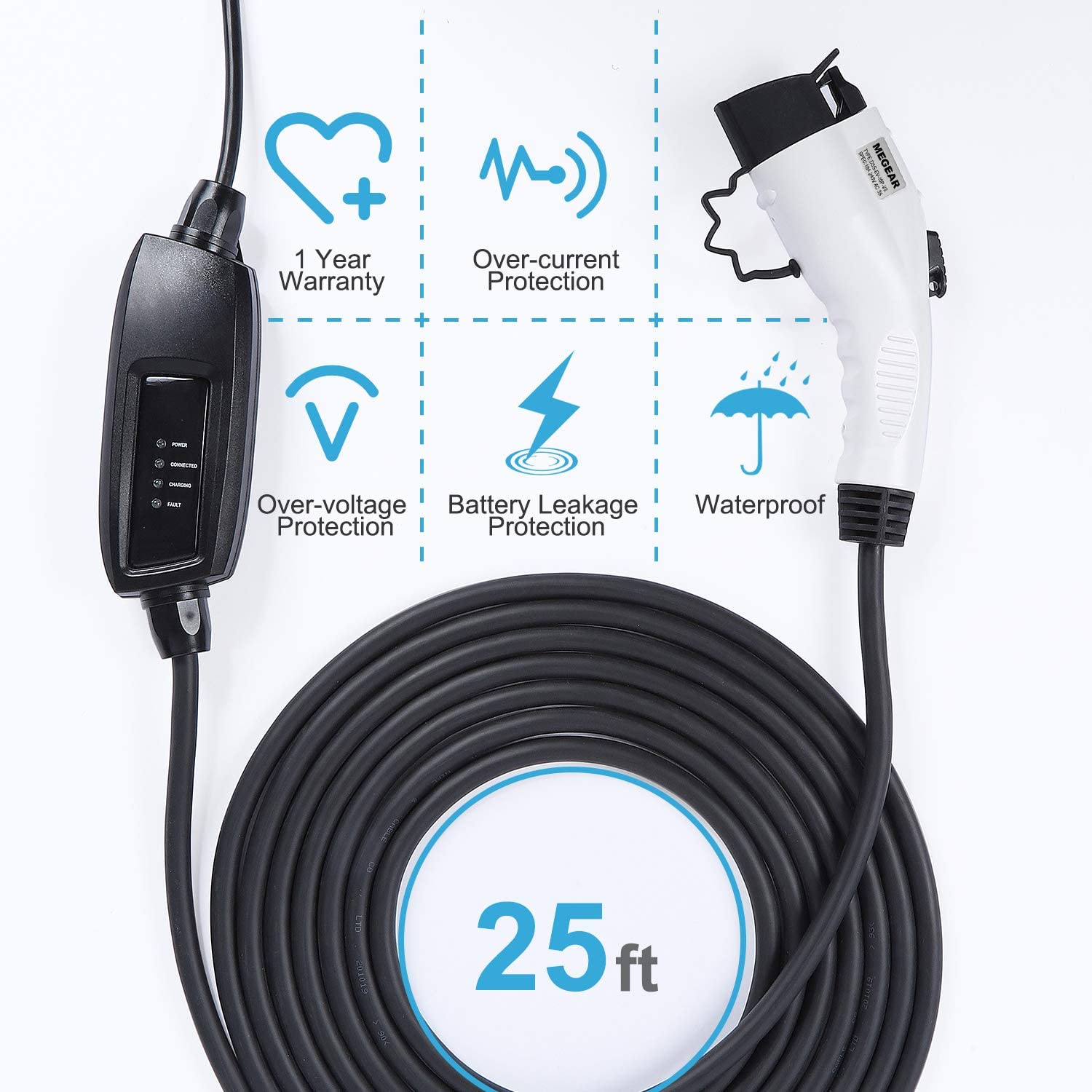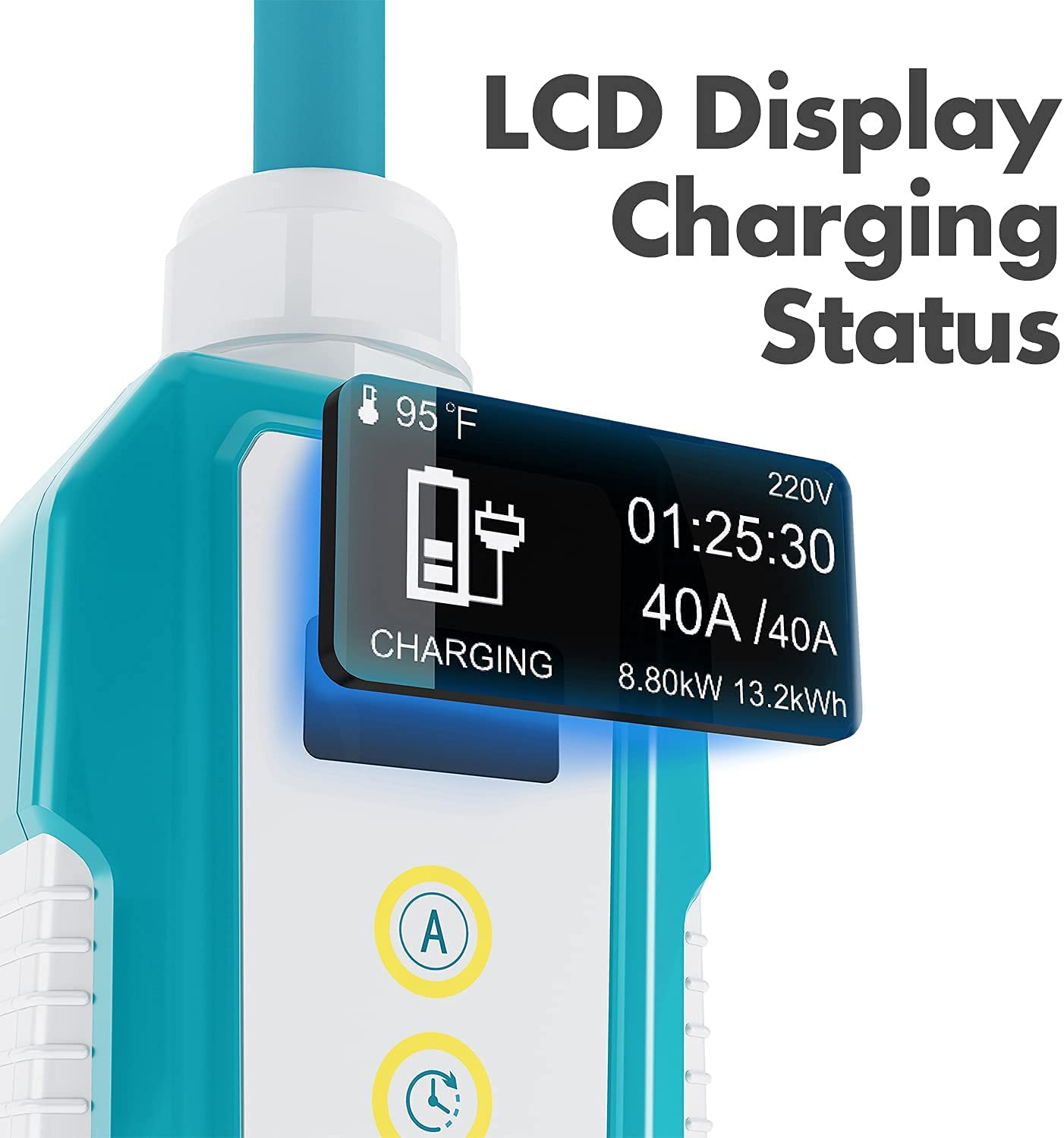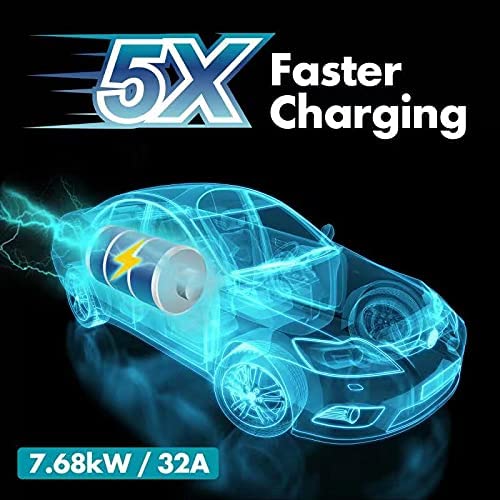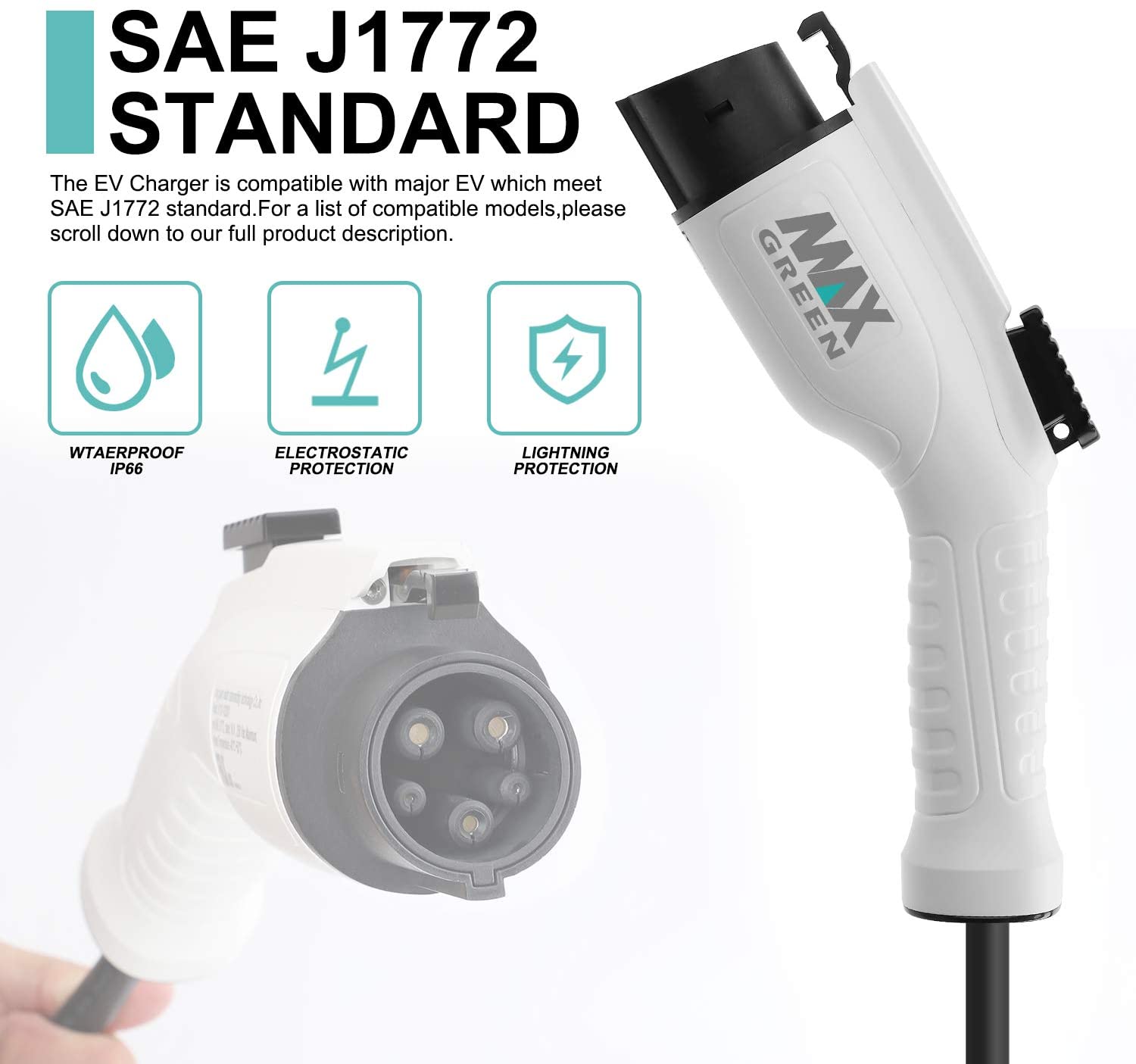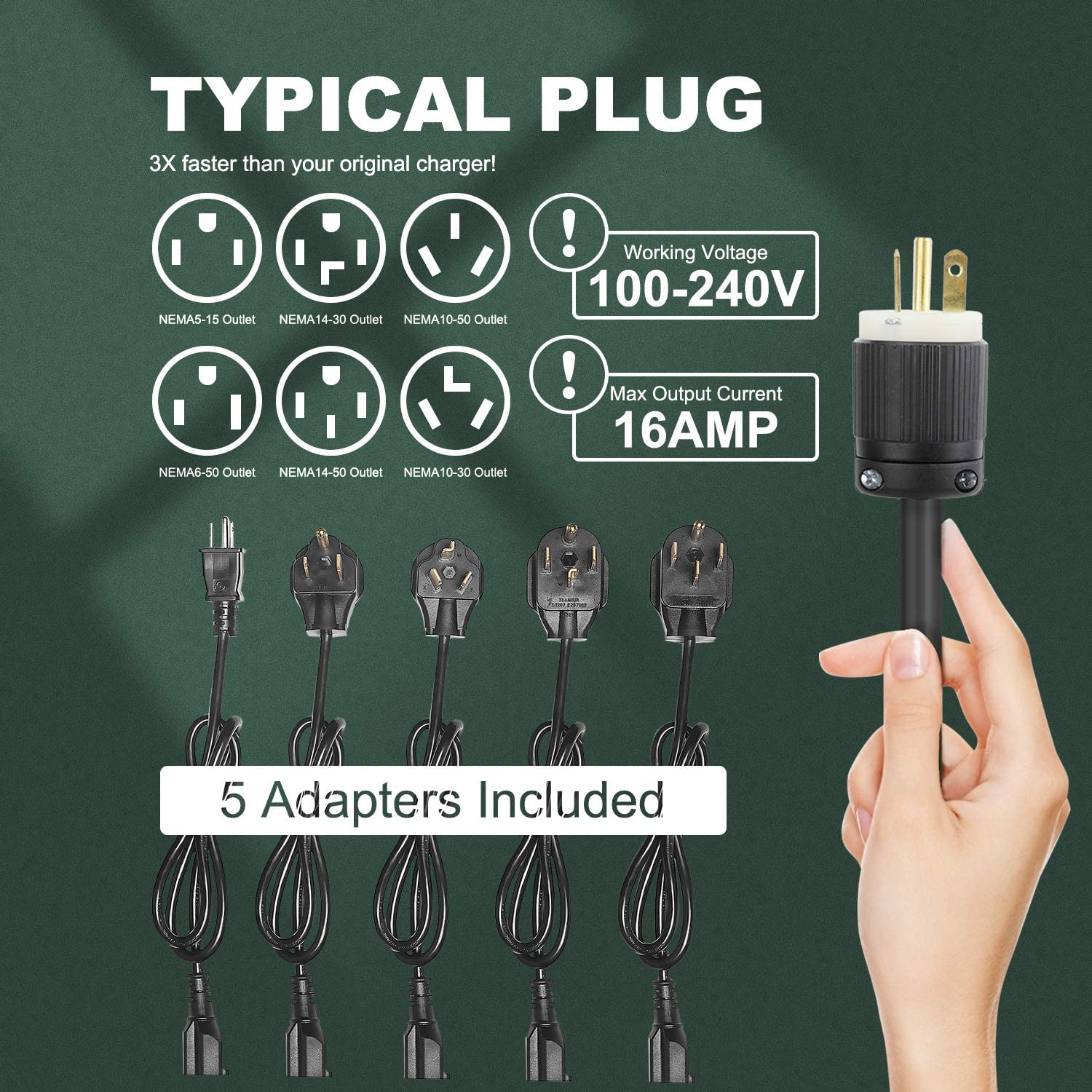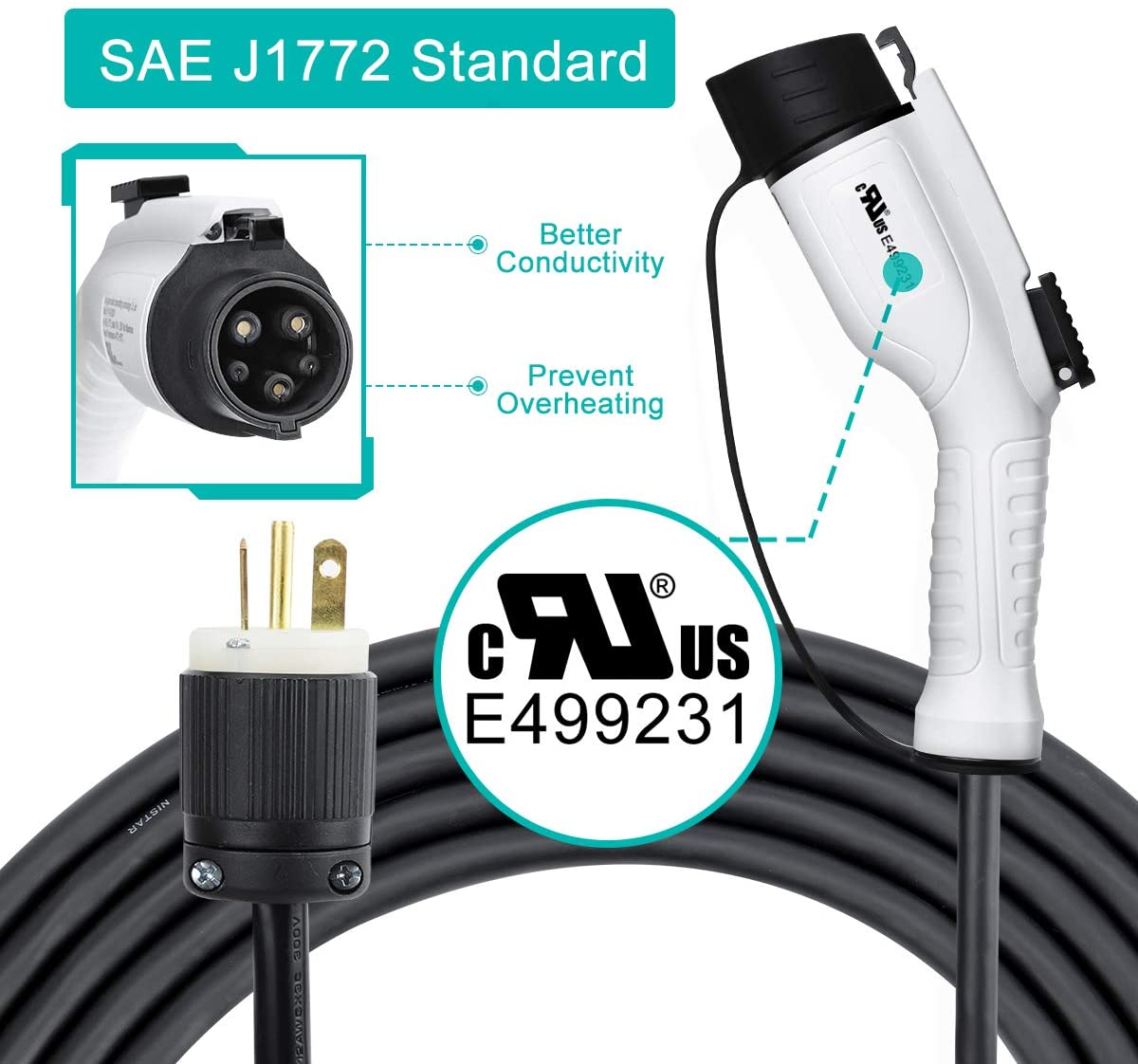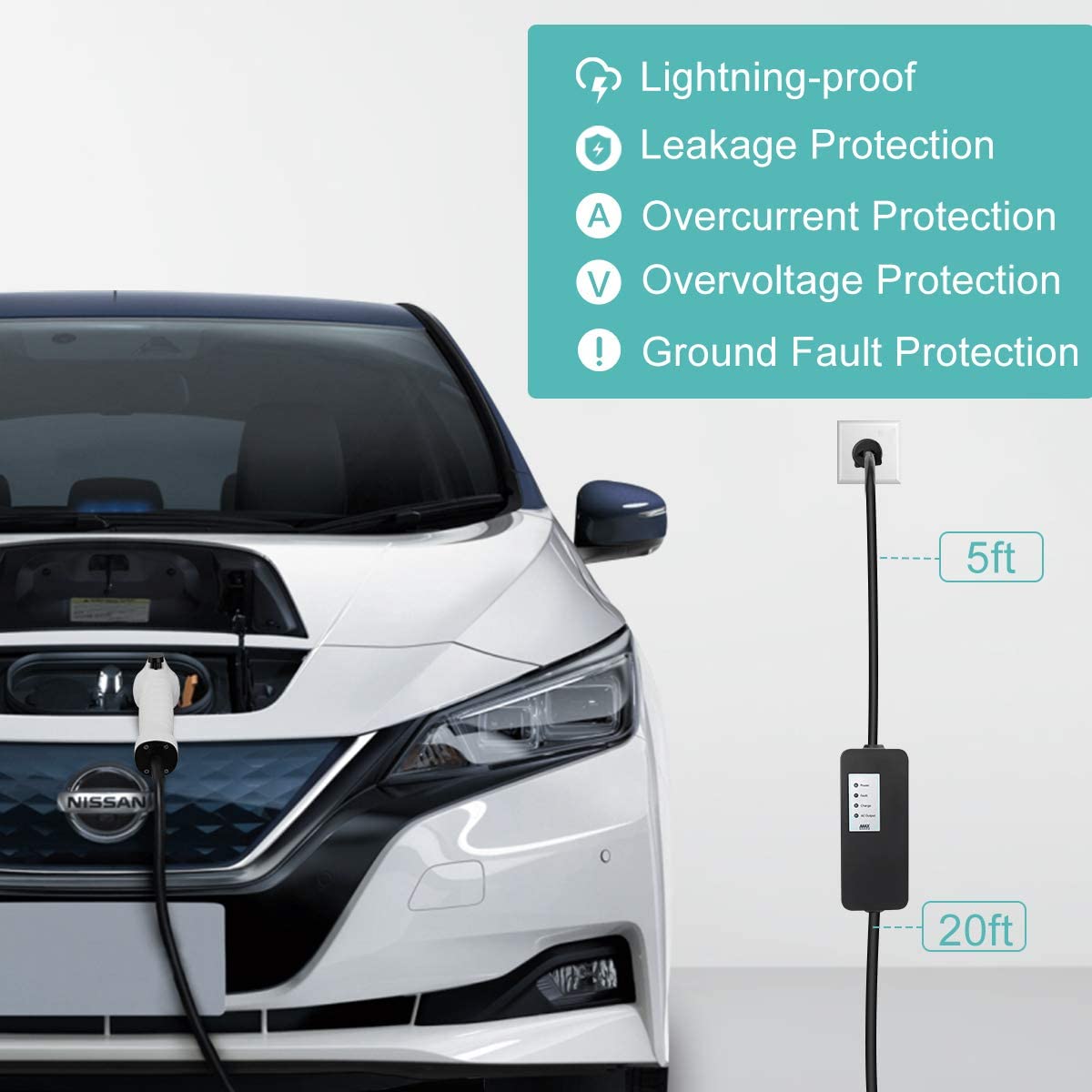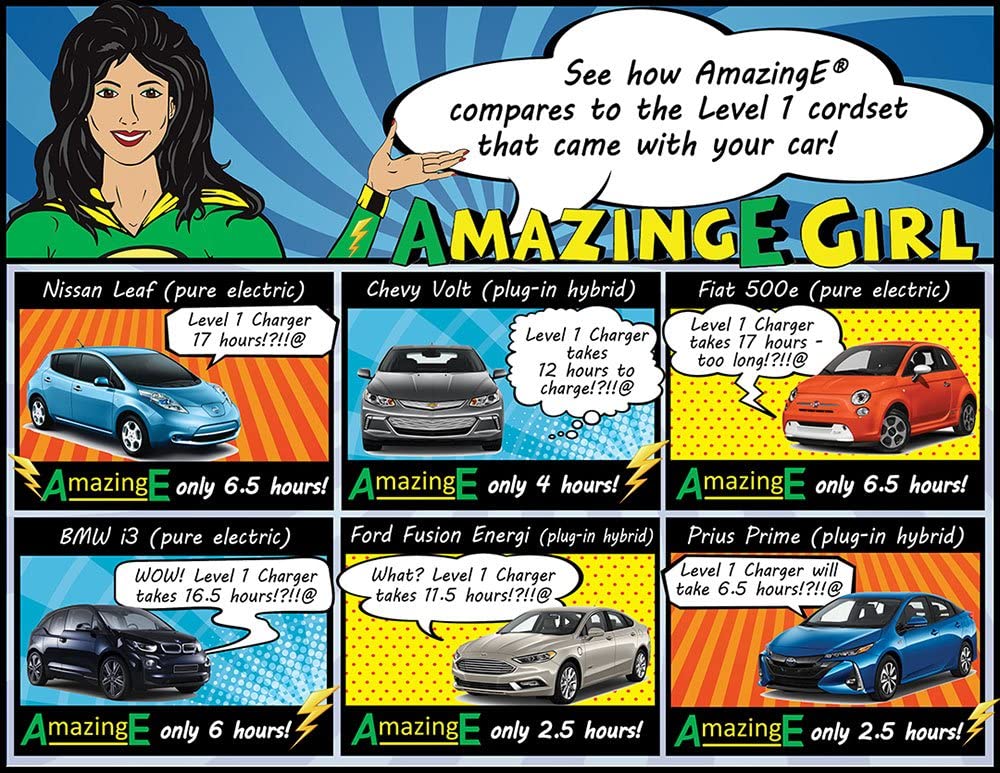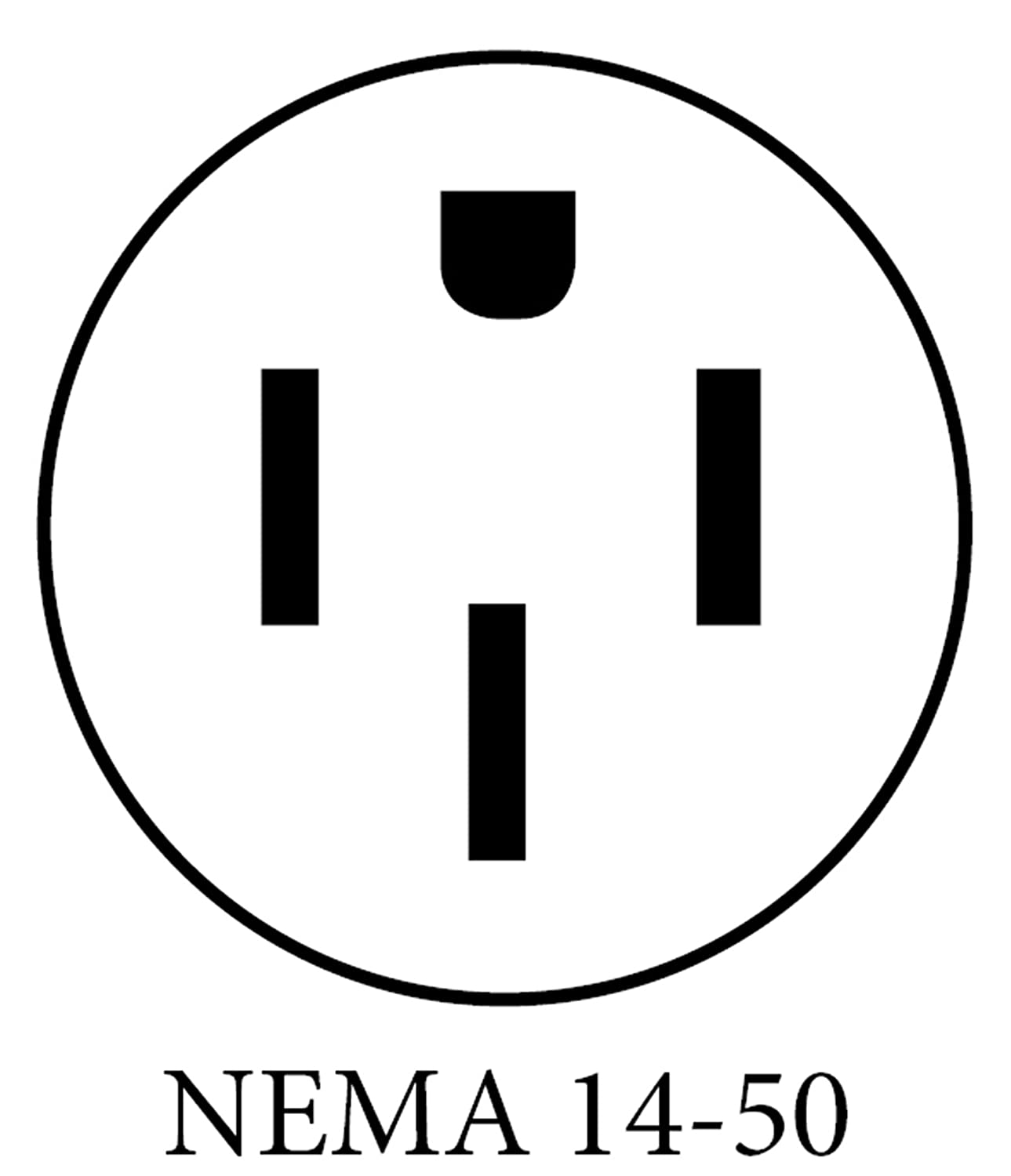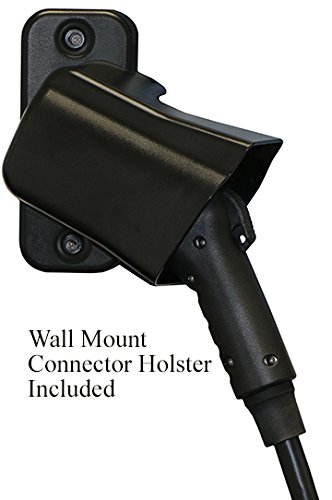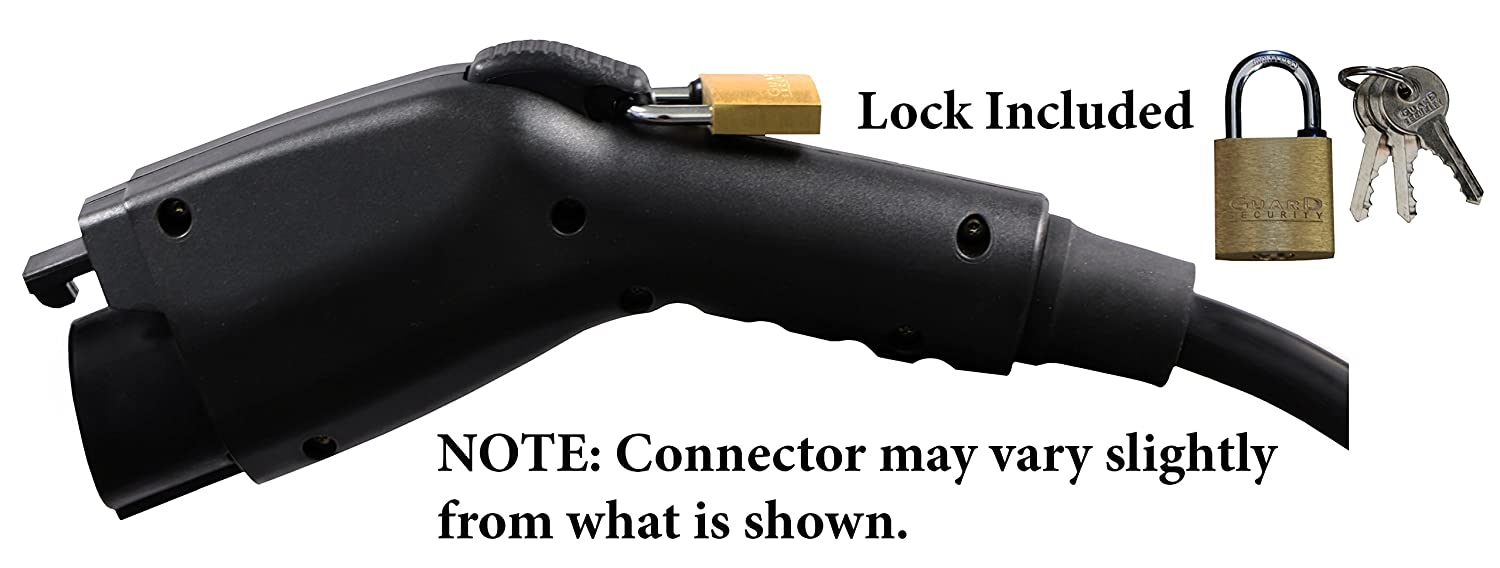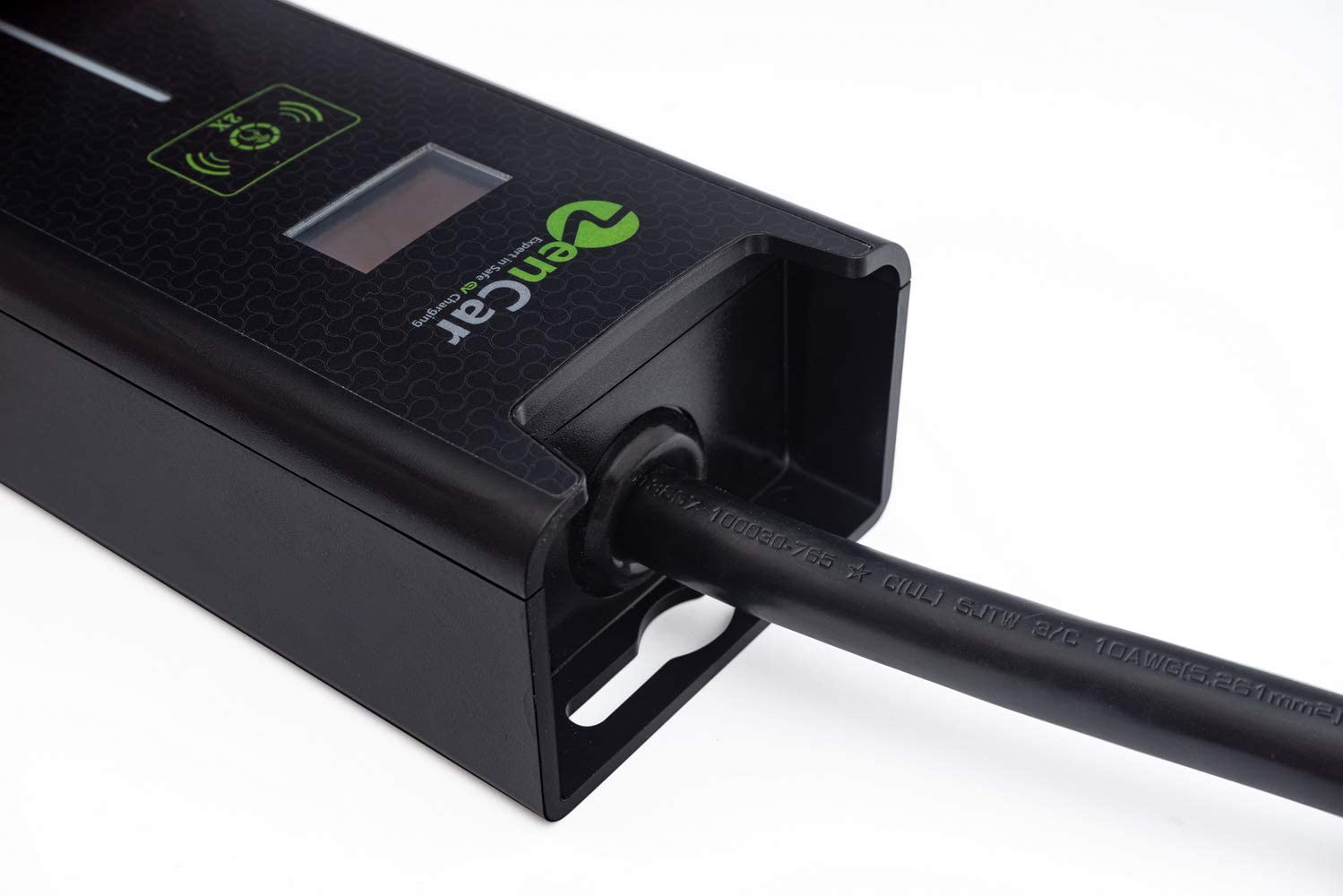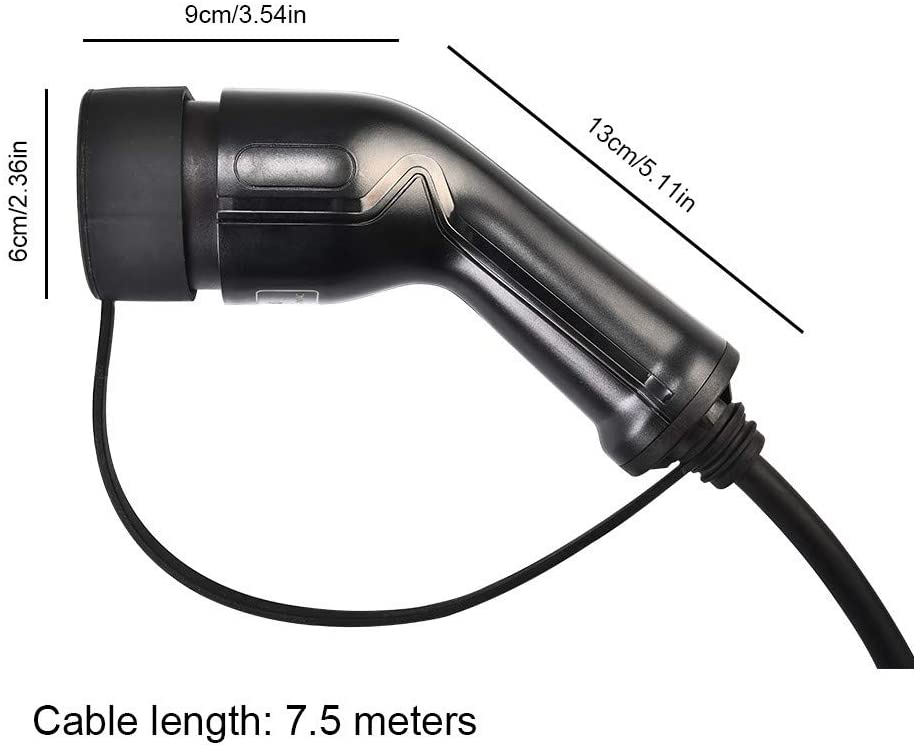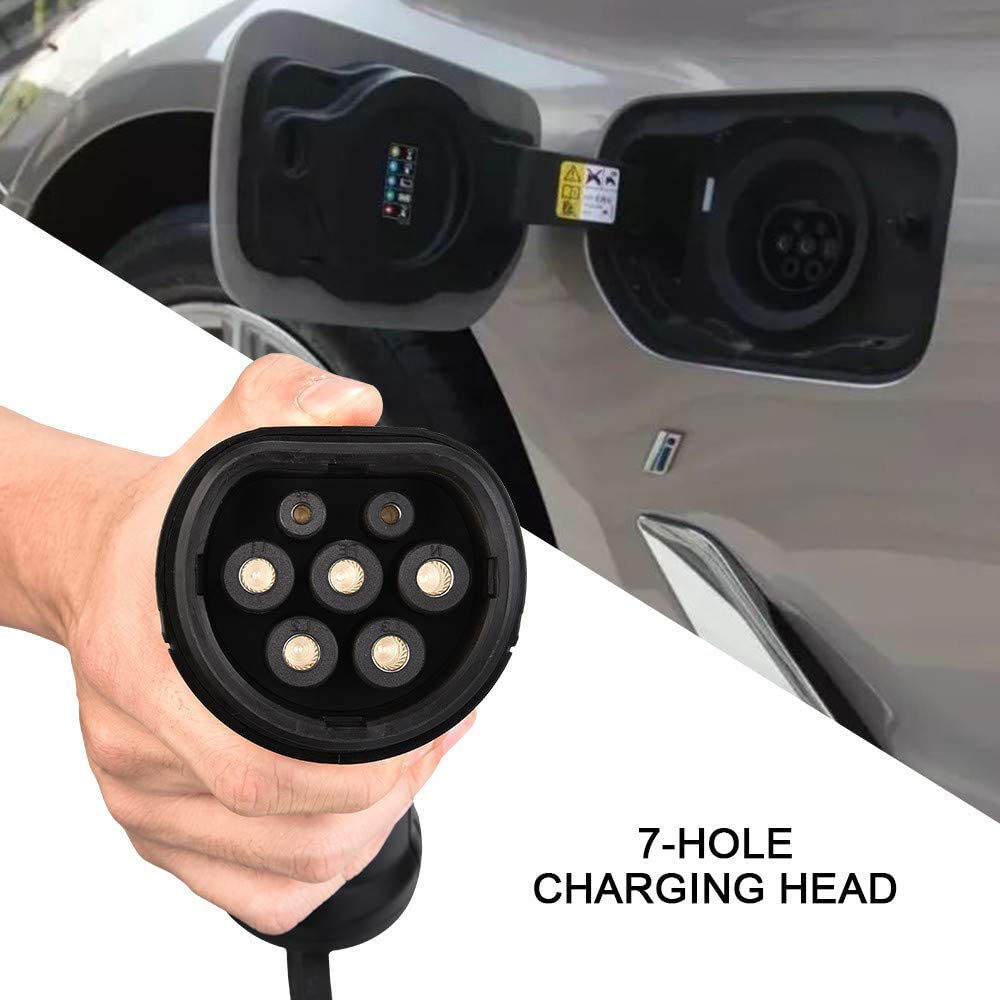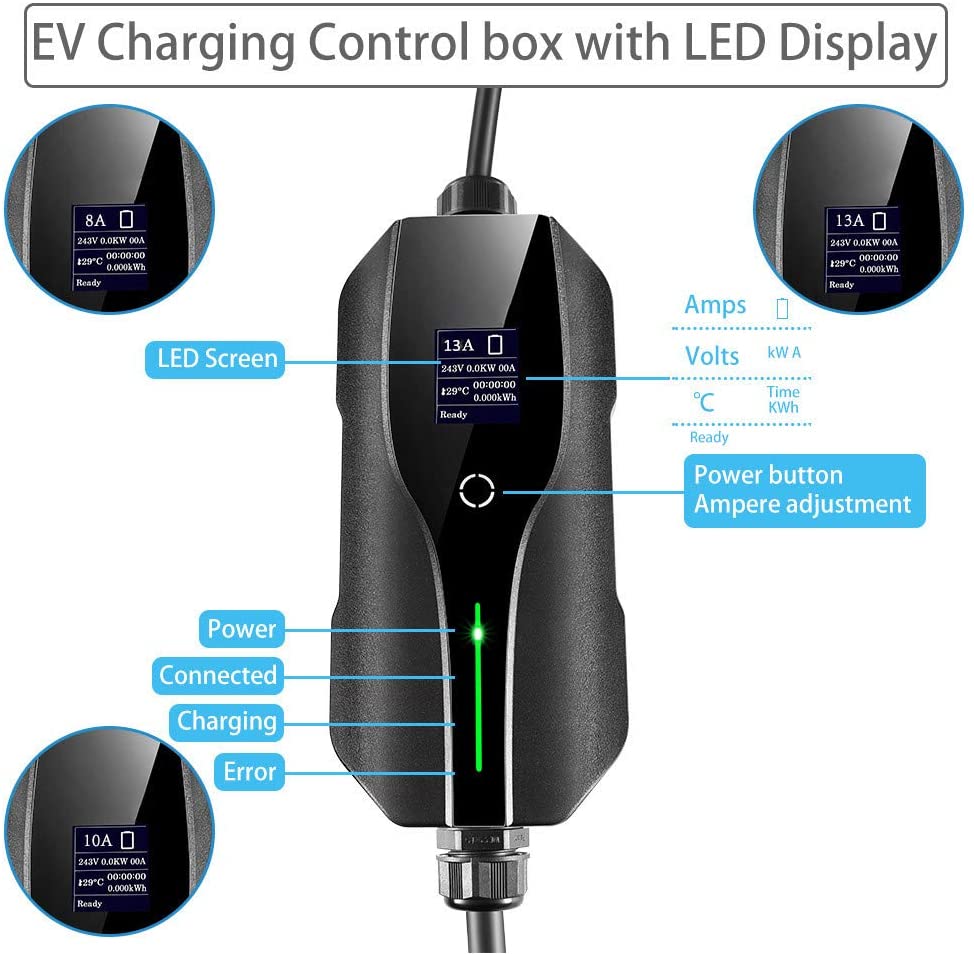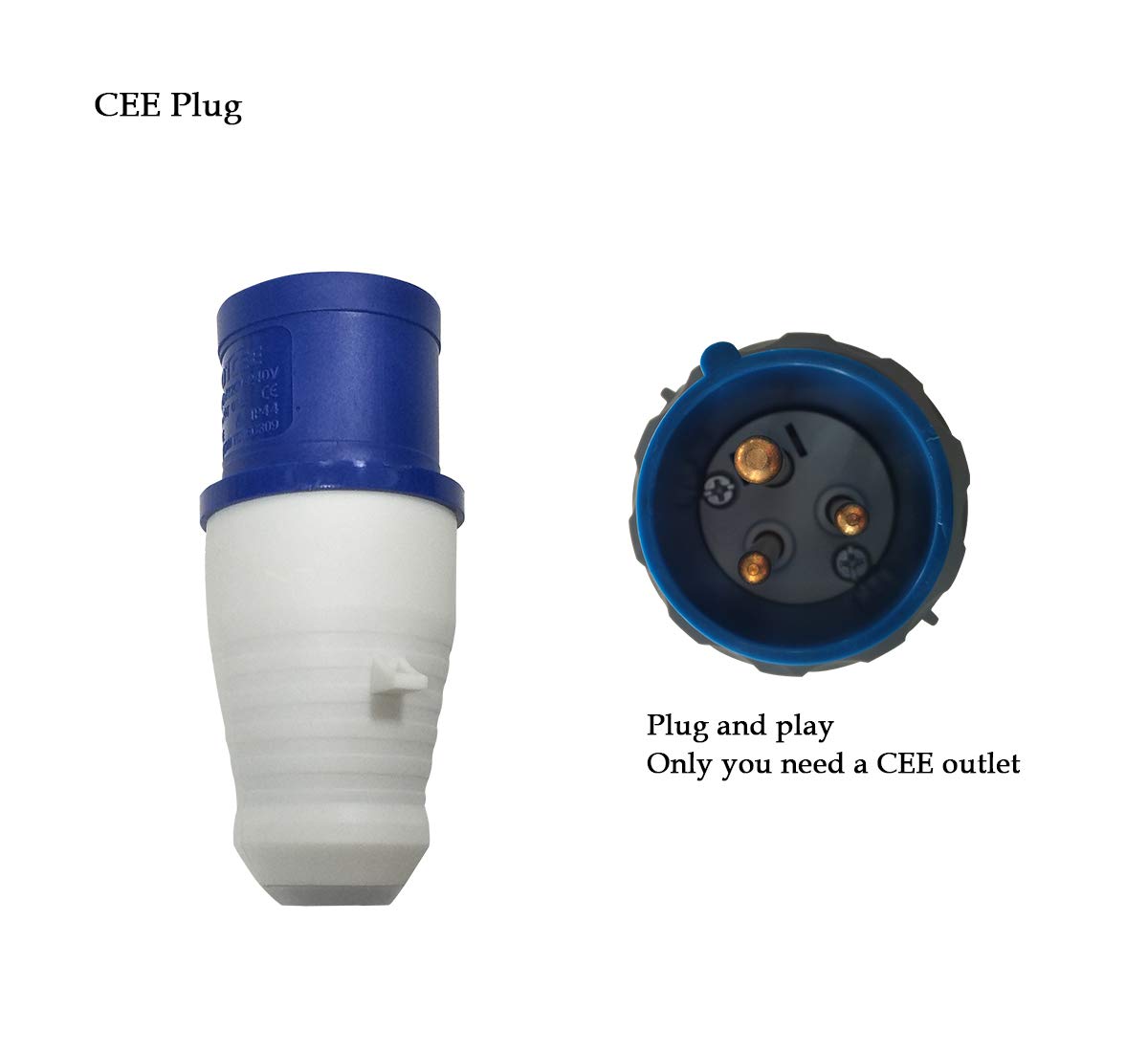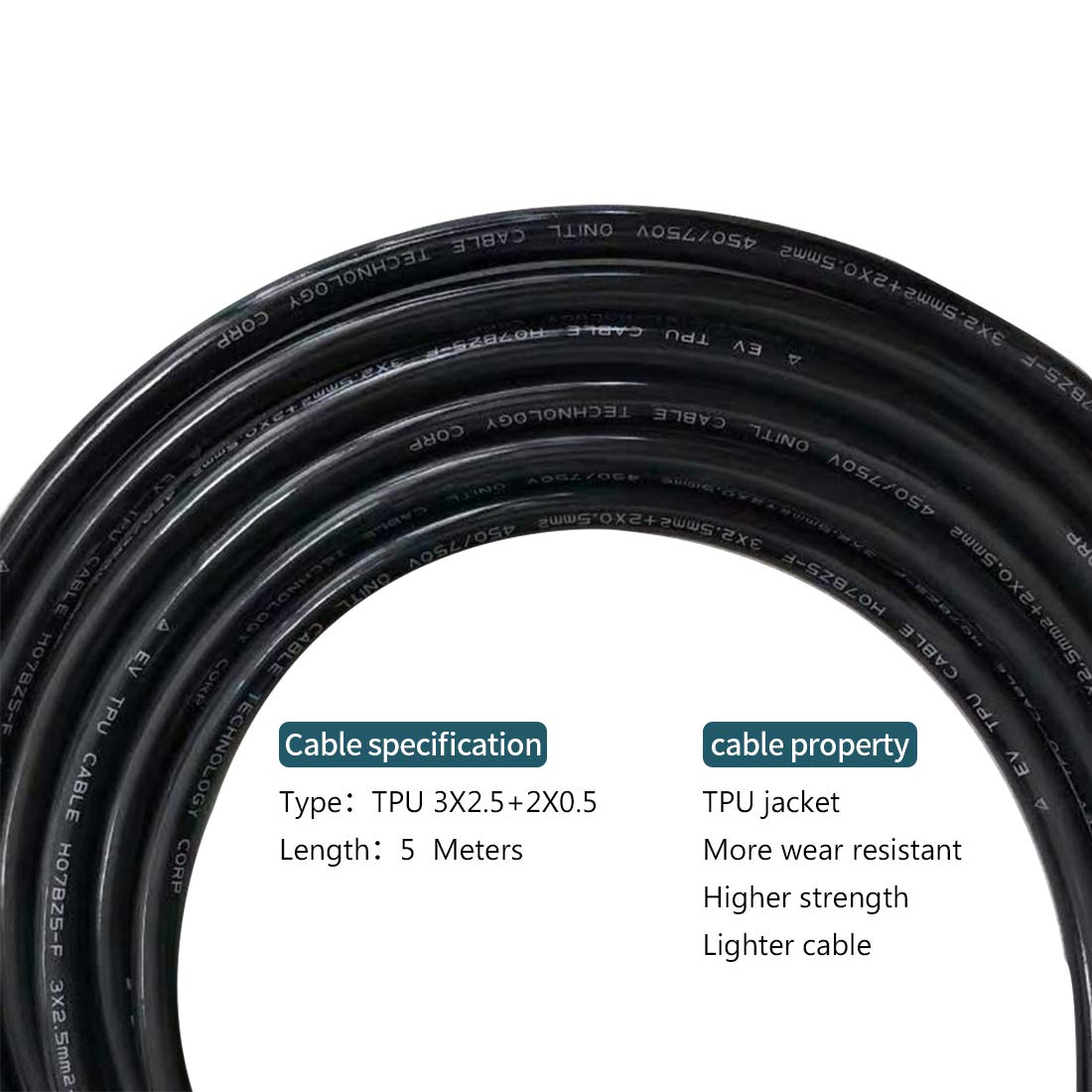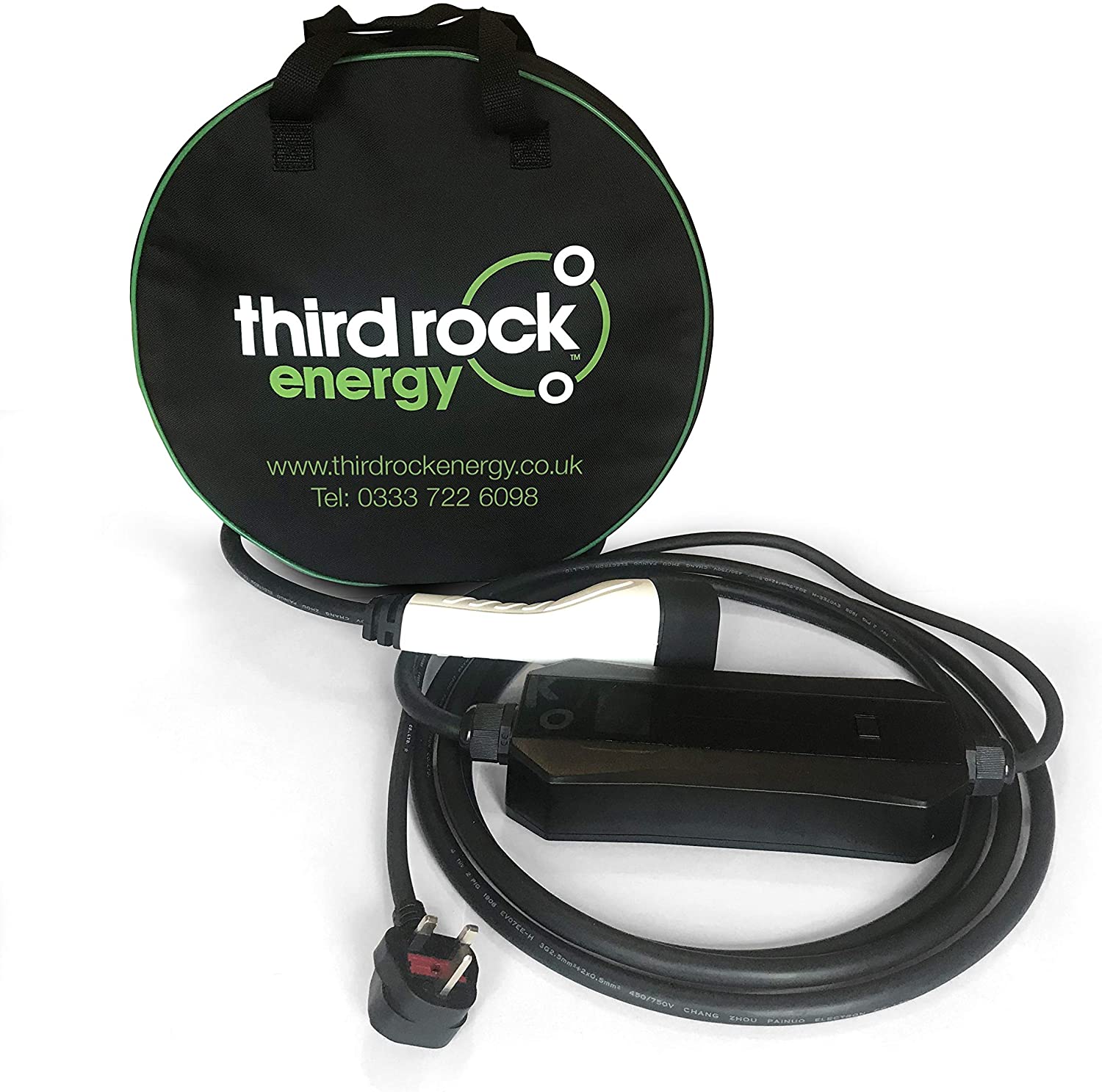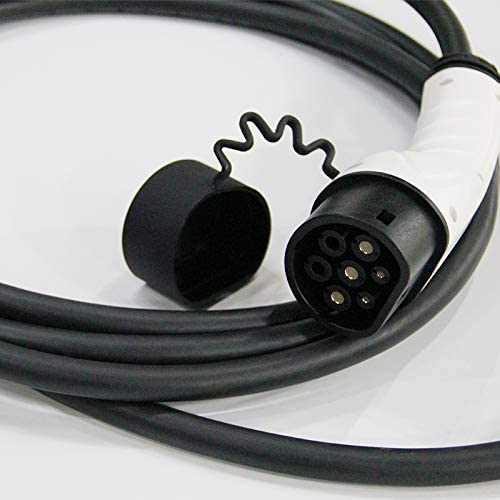Last Update: Tue Jul 27 2021 00:00:00 GMT-0700 (Pacific Daylight Time)
Let's start this exploration with a question: Why own a portable electric car charging station?
Home electric car charging stations are not a one-size-fits-all solution. Most home EVSE's are built for mounting on the wall. In such cases, size is an afterthought. But, not all of us can permanently mount a charging station this way, nor do all of us have the space for a large charging station. Fortunately, there are portable charging stations, small enough to be used anywhere, and that can be carried with us on trips.
Here are a few scenarios where a portable charging station is the best choice:
- Take on trips: When away from home we can't always find normal public charging stations. We might stay the weekend at a friends house, or have rented a cabin in the woods, or we're at a church retreat center for the weekend, or any other destination that lacks electric car charging stations. Often, we can arrange to use electricity at the destination, but if there's no charging station and we must bring our own.
- Tight home parking: All kinds of parking situations don't have room for a full size charging station. Maybe the garage is already full of stuff. Or we can't always use the same parking spot, and constantly need to reroute the charging equipment to match.
- Avoid having equipment stolen: A similar issue is cases where the charging station would be in the open, and should instead be put away when we're not at home. Maybe the house has a simple carport and no secured outdoors storage. A portable charging station can easily be put away when we leave, and taken out when we return.
- Lower cost: In some cases the portable charging stations are lower cost than the full size charging stations.
- Flexibity: A portable charging station can be used in more scenarios than ones installed at a fixed location.
- Better than the 120 volt line charger: Every electric car is sold with a portable charger, that typically runs on 120 volts. While this is better than no charging at all, it is completely unsuitable for a road trip. For example, fully recharging a 200+ mile range electric car on 120 volts would require a couple days. Supporting a road trip with a portable charging station requires as high a charging rate as you can manage.
For these and other reasons it is a good idea to buy a portable charging station.
How to use a portable electric car charging station
All EVSE's connect to the car the same way, by connecting charging cord into the charging socket. You can charge an electric car with a portable charging station just as easily as with any other kind of charging station. What counts is whether the charging cord is compatible with your car. Where a portable charging station differs is it's size, and a power plug letting it be plugged in as needed.
A fixed home charging station is hard-wired to an electric circuit connected to the service panel. A portable charging station is instead plugged-in to a power outlet.
Is a portable charging station as safe as a permanently installed EVSE?
The J1772 charging protocol and the charging connectors were carefully designed for safety. There are many interlocks built into the system to safely charge electric vehicles in all situations, even driving rain.
But, that's primarily the charging cord and charging plug. The rest of the charging station might not be as safe. Not all EVSE manufacturers have achieved UL certification, for example. Not all EVSE's are built to be water proof. In other words, pay careful attention to safety ratings.
Another extremely important consideration is understanding the energy capacity of a given electrical circuit. If your charging session exceeds the rating of the circuit you're using, theoretically all that will happen is the circuit breaker pops. If you're using a portable charging station at different power outlets, you must have a collection of adapter cords for each outlet, and the charging station power must be adjustable to stay within the limits of each outlet. See Electric car charging within electrical code and power outlet limits
Can I use a portable charging station at home?
Yes, of course portable charging stations are very useful at home. We don't always have space for a full size charging station.
Because a portable charging station connects to a regular power outlet, you must have a suitable outlet. The best choice is a 240 volt 50 amp outlet, if your electrical service panel has enough capacity for that much power.
Catalog of portable electric car charging stations
| EVSE | Power | Rate | Plug | Cord Length | Size |
|---|---|---|---|---|---|
|
|||||

|
12 amps @ 120 volts | 5 miles per hour of charging | J1772 type 1 | 25 feet | 15.8 x 14.7 x 3.2 inches |
This EVSE replaces the "Level 1" charging cord that comes with electric cars. It plugs into a regular 120 volt power outlet, and offers a similar charging rate. This is an inexpensive option for those times and places where the only power available is 120 volts. Curiously despite the low power capacity of this EVSE, it is sizeable and may not be suitable to carry in the car. It is compatible with all electric cars with a J1772 Type 1 (North America) charging inlet. To use this with a Tesla, you must use the J1772 adapter that came with the car. The product description does not have a clear description of the maximum charging rate. It is described as 15 Amps, but that is the rating for the plug on the end of the cord. Such ratings are for the maximum current rate allowed through that plug. But, because EV charging is a "continuous load", the charging rate must be kept at 80% of the maximum rate in order to fit within the electrical code. Therefore if this EVSE actually supports a 15 Amp charge rate, it is violating the electrical code. When the product description claims it charges an EV at up to 2x the rate of the manufacturer-supplied EVSE, that can only be true for cars supplied with an ultra-low-power EVSE of around 6 amps. The product description claims "safety", but this EVSE does not carry any certification from CE or UL or other testing agencies. It does say the box is IP55 certified, but the manufacturer then suggests to not store this unit outdoors. The product name says it has a 25 foot charging cord. But the manufacturer images shows 1.5 meters for the pigtail cord, 0.5 meters for the EVSE, and 6 meters for the charging cord. That total length does not quite reach 25 feet. In other words, there are a number of suspicious claims about this EVSE, and it might be best to pass it by.
Purchase Options
Sponsored
|
|||||
|
|||||
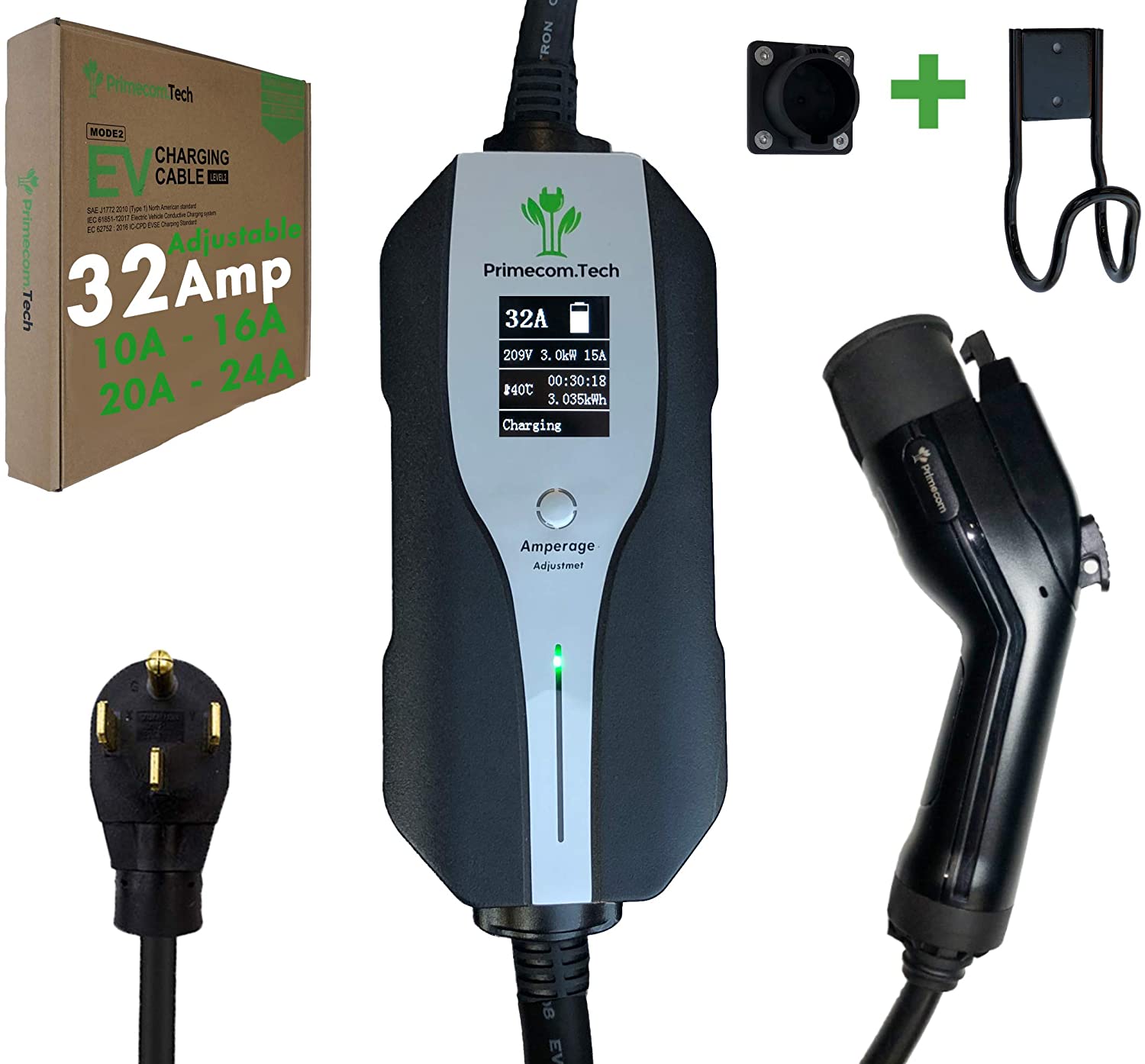
|
32 amps @ 240 volts | 23 miles per hour of charging | J1772 type 1 | 30 feet | 8 x 3.5 x 2 inches |
At first glance this EVSE looks to be perfect. It supports up to 32 Amp charging, and the charging rate is easily adjustable via a button on the front, and charging status is clearly displayed on the information screen. It even accommodates being used on a regular 120 volt power outlet, making it a hybrid Level 1/Level 2 charger. It is small enough to be easily carried in the car ready to be used anywhere you find a power outlet. Additionally it is available an ultra-long cord, up to 50 feet long, letting you use this EVSE in more situations. Because it is clearly certified with CE, and UL, and it is built in an IP67 case, it should be a very safe charging station. It is compatible with all electric cars with a J1772 Type 1 (North America) charging inlet. To use this with a Tesla, you must use the J1772 adapter that came with the car. It is necessary to carefully choose the specific model for this EVSE. The company sells several versions set up for different power outlets, such as the NEMA L6-30 or NEMA 14-50. If you buy this with a lower rated plug, like the L6-30, you must be careful to not use more a higher charge rate than what's supported by the plug. EV Charging is a "continuous load", so the charging rate must be kept to 80% of the maximum rate. To use this with a 30 amp plug means keeping the charging rate at or below 24 amps. Buying it with the NEMA 14-50 plug is the most flexible, but requires getting adapter cords to use it with other power outlets.
Purchase Options
Sponsored
|
|||||
|
|||||
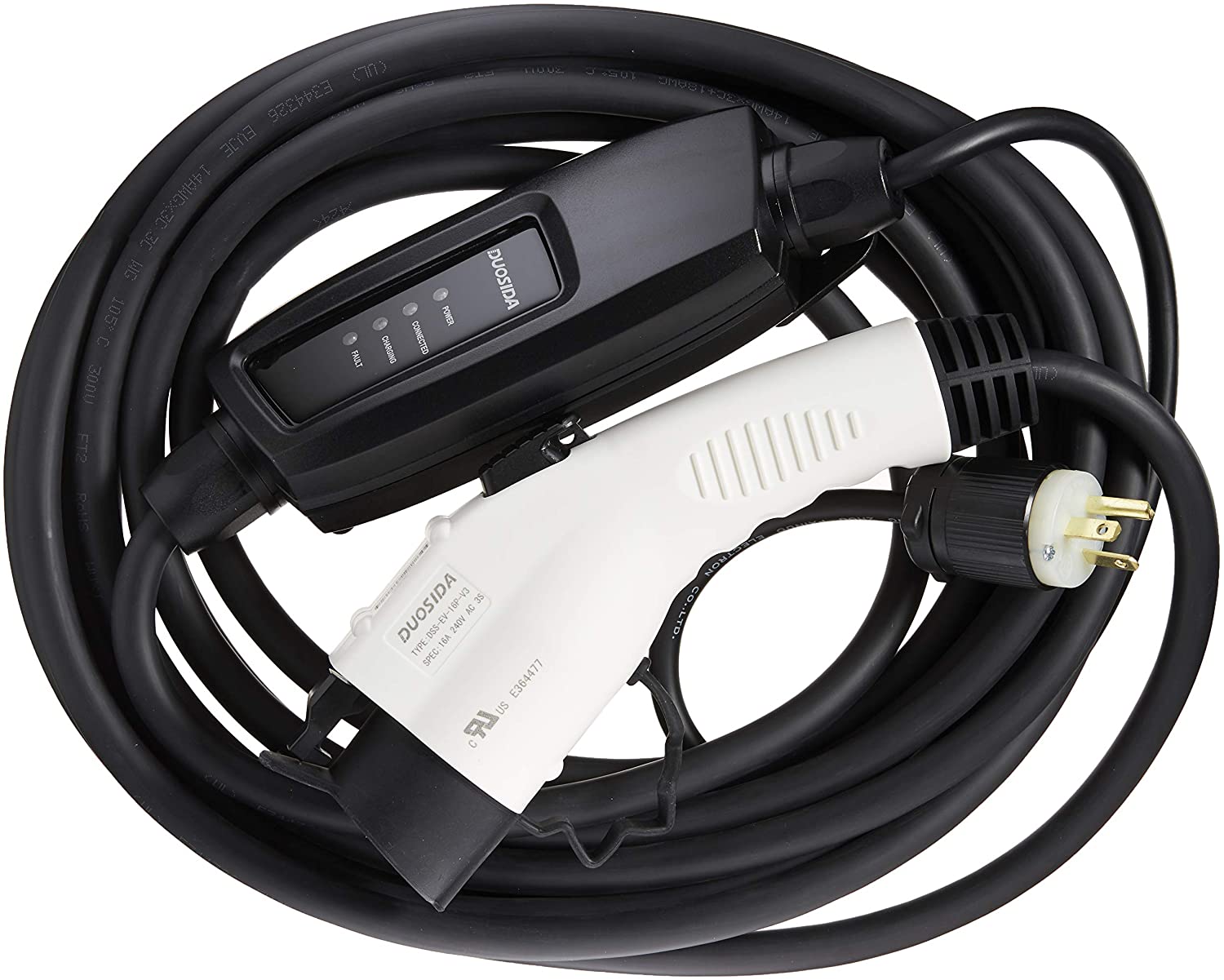
|
16 amps @ 240 volts | 16 miles per hour of charging | J1772 type 1 | 25 feet | 16.61 x 12.4 x 4.92 inches |
This small, light-weight, portable charging station is suitable both for carrying in the car, and for charging at home. The charging rate, at 3.84 kW, is capable of an overnight recharge of over 100 miles range. Natively it has a NEMA 6-20 plug for a 20 Amp 240 volt outlet, and it comes with an adapter allowing you to use this on a regular 120 volt outlet. It also comes with a carrying bag should you wish to carry it in the car. It is compatible with all electric cars with a J1772 Type 1 (North America) charging inlet. To use this with a Tesla, you must use the J1772 adapter that came with the car.
Purchase Options
Sponsored
|
|||||
|
|||||
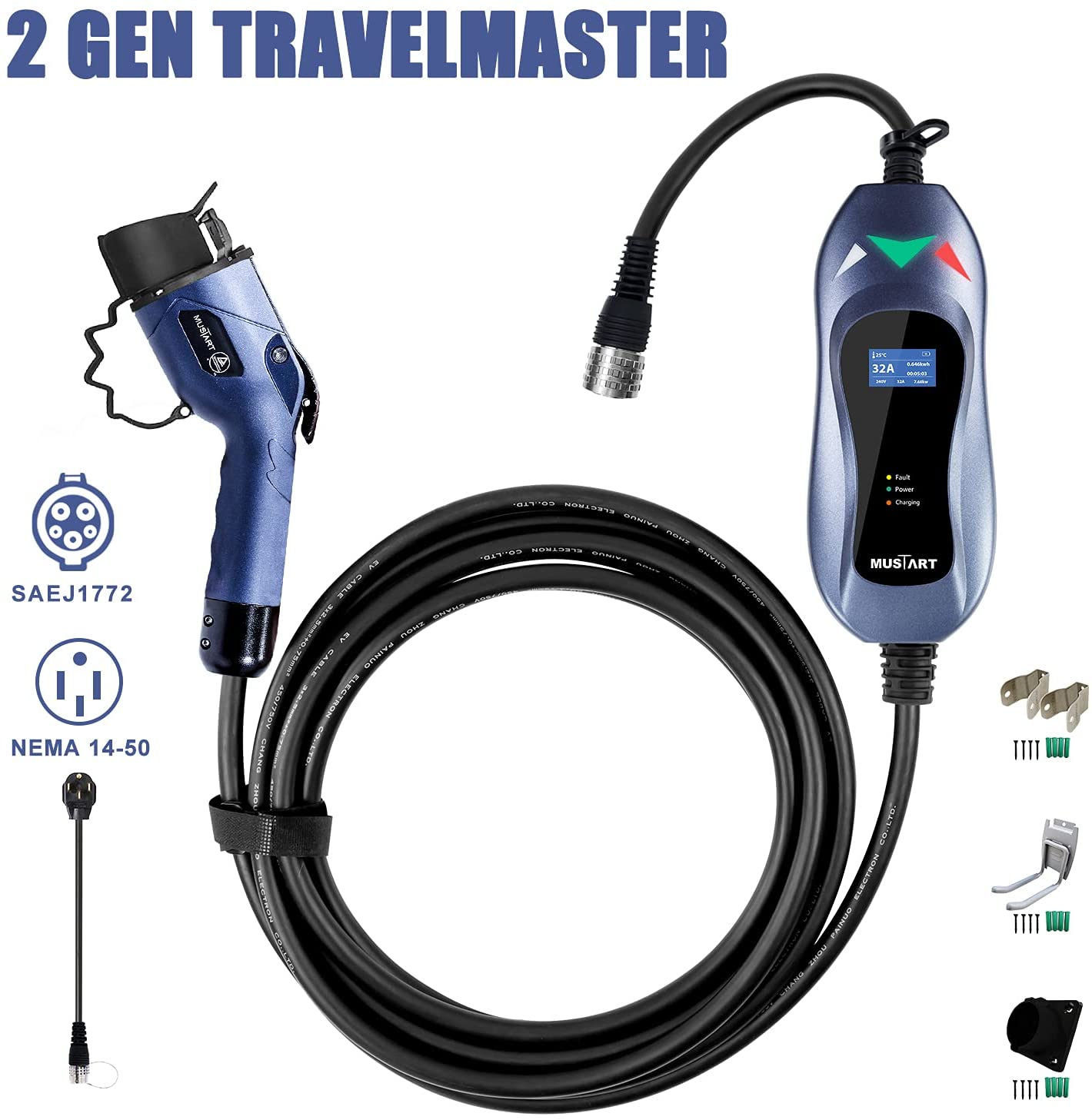
|
40 amps @ 240 volts | 25 miles per hour of charging | J1772 type 1 | 25 feet | 9 x 4 x 4 inches |
This small and light EVSE packs a lot of power, supporting up to a 40 amps charging rate for over 25 miles of range gained per hour of charging. That's sufficient to fully recharge 200 miles of range overnight. It comes with a NEMA 14-50 plug, and therefore installation requires a matching outlet. Mounting hardware is provided to easily attach the Mustart EVSE to the wall of your garage. You can easily unclip the EVSE from the mount, for example to carry it in your car. A most useful feature is the cord connecting to the power outlet is designed to be swapped. Mustart makes a range of TRAVELMASTER cords for this charging station supporting NEMA 5-15 (120 volt), and NEMA 6-20, 10-30, 14-30 and 10-50 (240 volt) power outlets. Simply buy the adapter cords you need, and swap them as needed. The TRAVELMASTER charging station automatically configures itself based on the cord being used. The charging cord is safe to be used outdoors, even in the rain. However the manufacturer warns us to not mount the charging station outdoors since the IP55 case is not weather safe. There is a nice information display showing status like voltage and charging rate.
Purchase Options
Sponsored
|
|||||
|
|||||
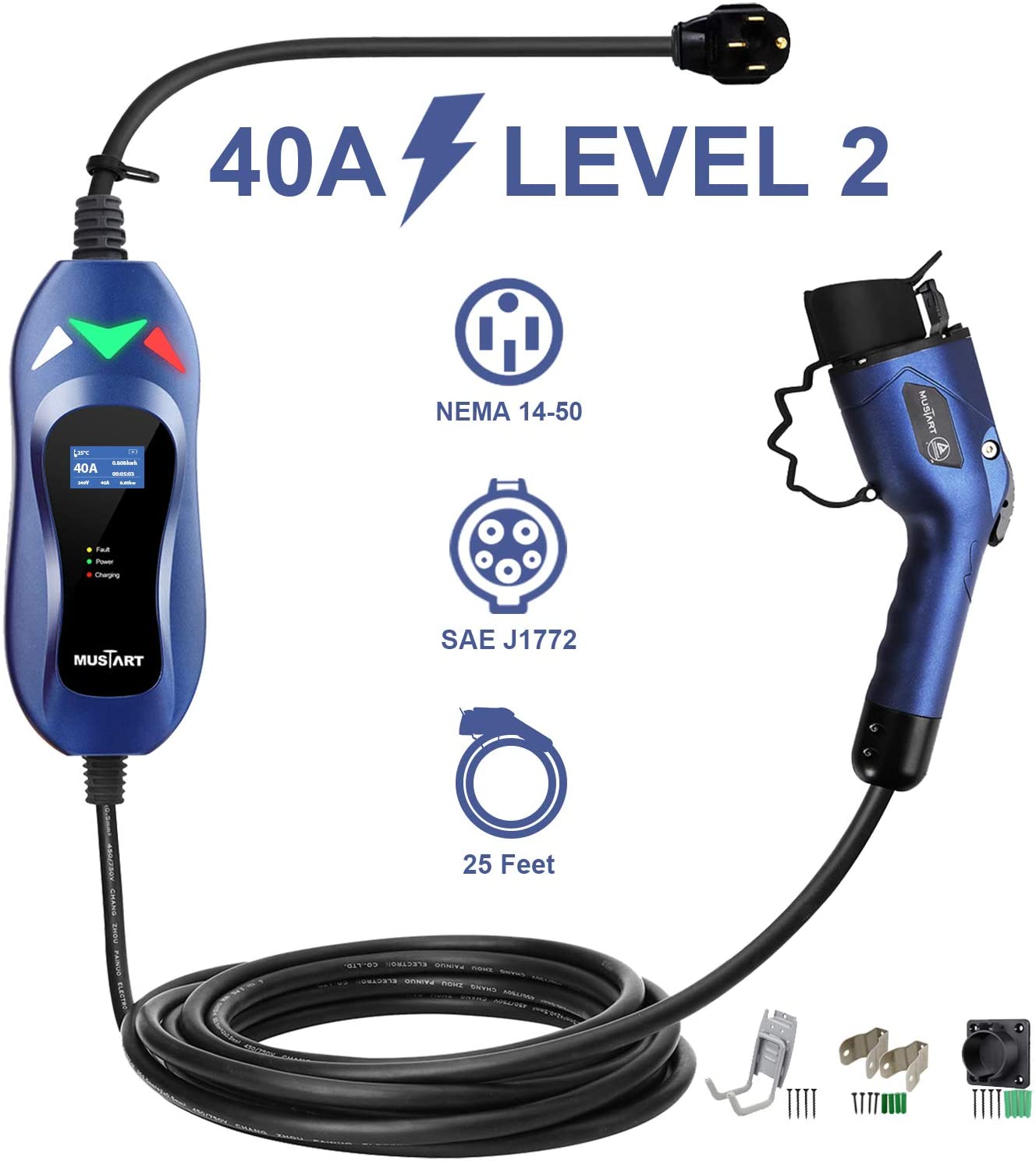
|
40 amps @ 240 volts | 25 miles per hour of charging | J1772 type 1 | 25 feet | 9 x 4 x 4 inches |
This small and light EVSE packs a lot of power, supporting up to a 40 amps charging rate for over 25 miles of range gained per hour of charging. That's sufficient to fully recharge 200 miles of range overnight. It comes with a NEMA 14-50 plug, and therefore installation requires a matching outlet. Mounting hardware is provided to easily attach the Mustart EVSE to the wall of your garage. You can easily unclip the EVSE from the mount, for example to carry it in your car. The charging cord is safe to be used outdoors, even in the rain. However the manufacturer warns us to not mount the charging station outdoors since the IP55 case is not weather safe. There is a nice information display showing status like voltage and charging rate.
Purchase Options
Sponsored
|
|||||
|
|||||
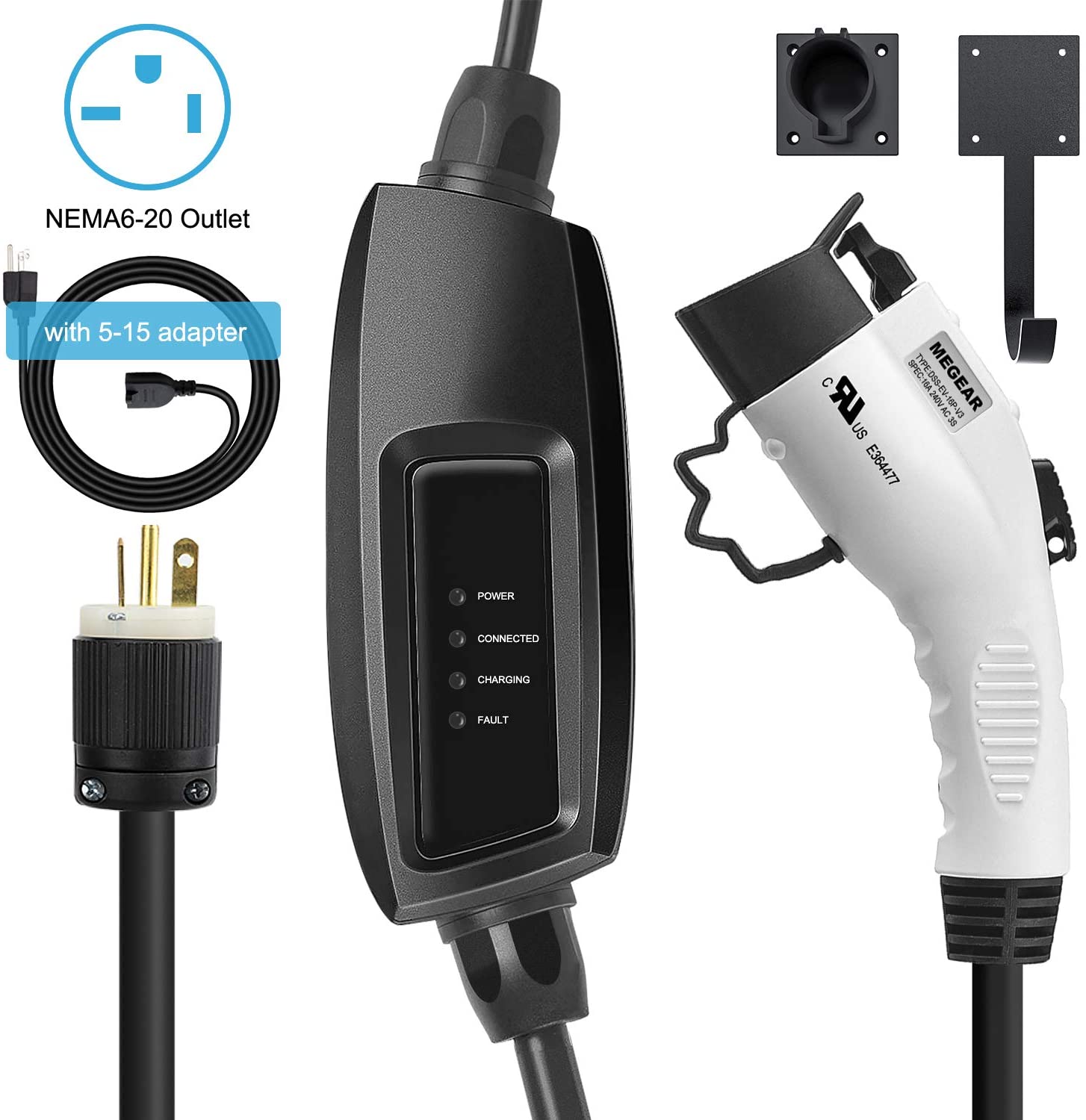
|
16 amps @ 240 volts | 11 miles per hour of charging | J1772 type 1 | 18 feet | 16.42 x 12.28 x 5.04 inches |
This is a compact and light-weight electric car charging station that is equally useful at home or on the road. Supplied is the mounting hardware to attach this EVSE to the wall, plugged into either a 120 volt or 240 volt power outlet. Or, using the included bag, you can easily stow it in your car, giving you the option of 240 volt charging away from home. By default this plugs into a NEMA 6-20 outlet. To use a different 240 volt outlet will require an adapter cord. To use it with a regular 120 volt outlet (NEMA 5-15), there is a supplied adapter cord. At 240 volts the 16A charge rate means your car will gain roughly 11 miles of range per hour of charging. In an overnight charging session, your car will gain well over 100 miles range. That's a lot more useful than the 4 miles range per hour you get with a 120 volt outlet. At 120 volts the charge rate appears to drop to 12A, which is 1.2 kiloWatts. The manufacturer, however, advertises it as supporting 1.9 kiloWatts, which is 120 volts 16 amps.
Purchase Options
Sponsored
|
|||||
|
|||||
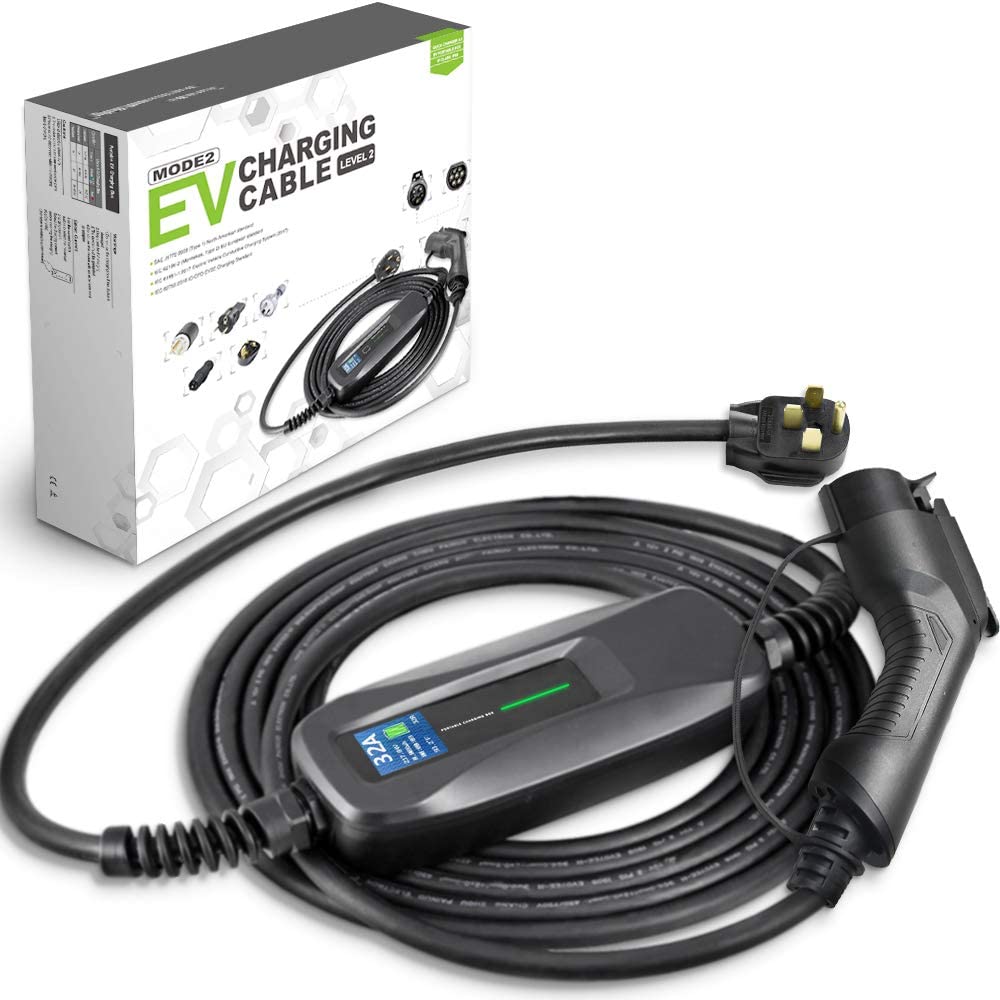
|
32 amps @ 240 volts | 20-25 miles per hour of charging | J1772 type 1 | 25 feet | 16.42 x 12.28 x 5.04 inches |
This is a compact and light-weight electric car charging station that is equally useful at home or on the road. By default this plugs into a NEMA 14-50 outlet. To use a different 240 volt outlet will require an adapter cord. But, because this EVSE does not support adjusting the charging rate, it must be plugged into an electric circuit supporting 40 amps or more. All EVSE's negotiates the charging rate with the car. The issue is that the Morec charger does not support decreasing the charging rate if connected to an electric outlet with less capacity than 40 amps. At 240 volts the 32A charge rate means your car will gain roughly 20-25 miles of range per hour of charging. In an overnight charging session, your car will gain well over 200 miles range. That's a lot more useful than the 4 miles range per hour you get with a 120 volt outlet.
Purchase Options
Sponsored
|
|||||
|
|||||
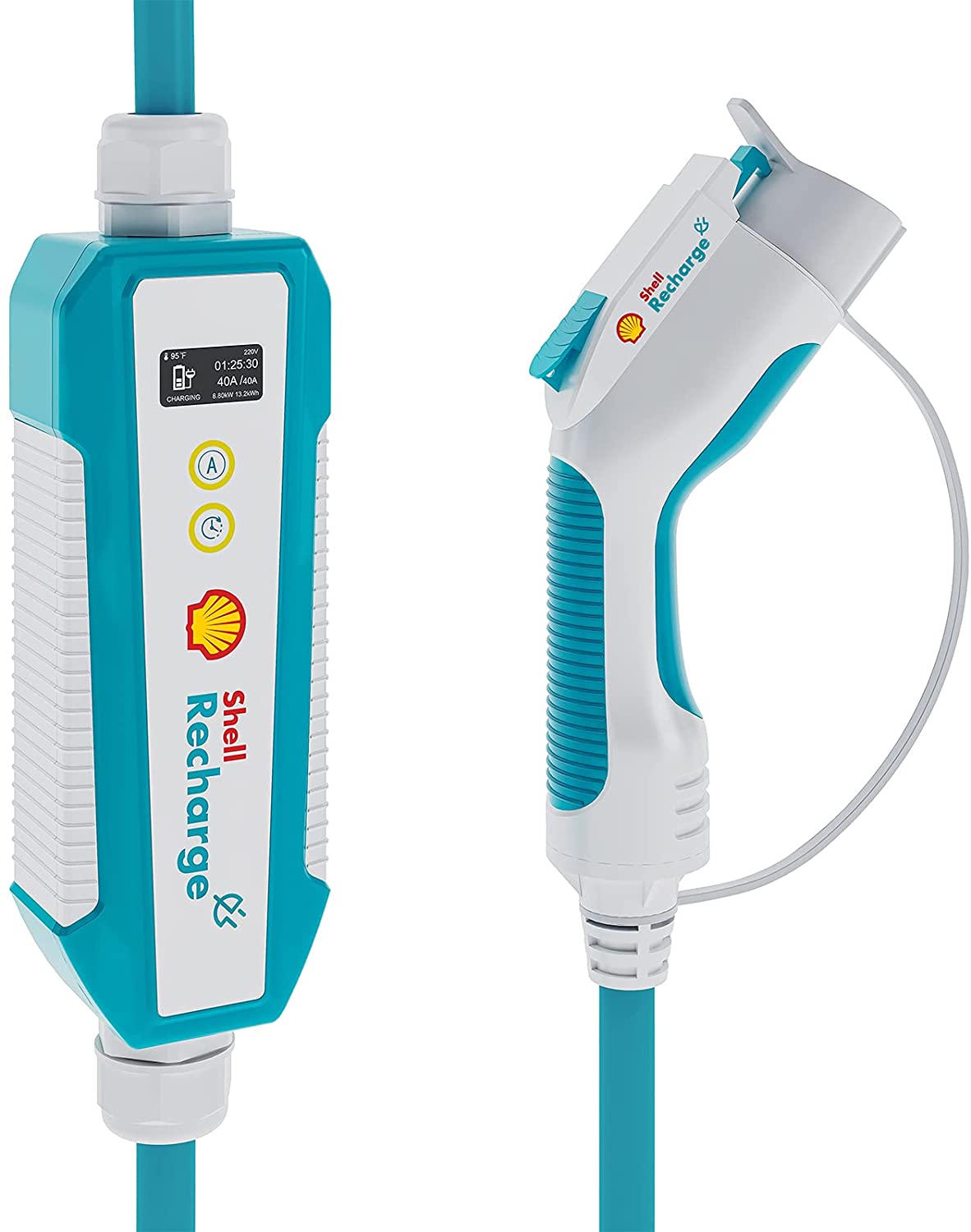
|
40 amps @ 240 volts | 25 miles per hour of charging | J1772 type 1 | 24 feet | |
Shell is obviously better known for selling products derived from crude oil or natural gas, like gasoline. It's refreshing to see such a company jump into the electric vehicle game. The Shell Portable Electric Vehicle Charger is exactly that, a highly portable EVSE that does not scrimp on charging power. It is small enough to be kept in your car full time, allowing you to charge on the go anywhere you can find a suitable power outlet. It even comes with a convenient hard-shell box to carry the EVSE. For power, it comes with a NEMA 14-50 power plug. This supports up to 40 amps charging. It supports adjustable current settings, and a timer, so you can control charging power and schedule. An adapter is provided for use with regular NEMA 5-15 power outlets in case 120 volts is the only power outlet you can find. The enclosure is not weather proof, so it must be protected from rain. However, the charging cord is IP66 rated and can be used outdoors. This EVSE is a good choice if you regularly charge at regular power outlets.
Purchase Options
Sponsored
|
|||||
|
|||||
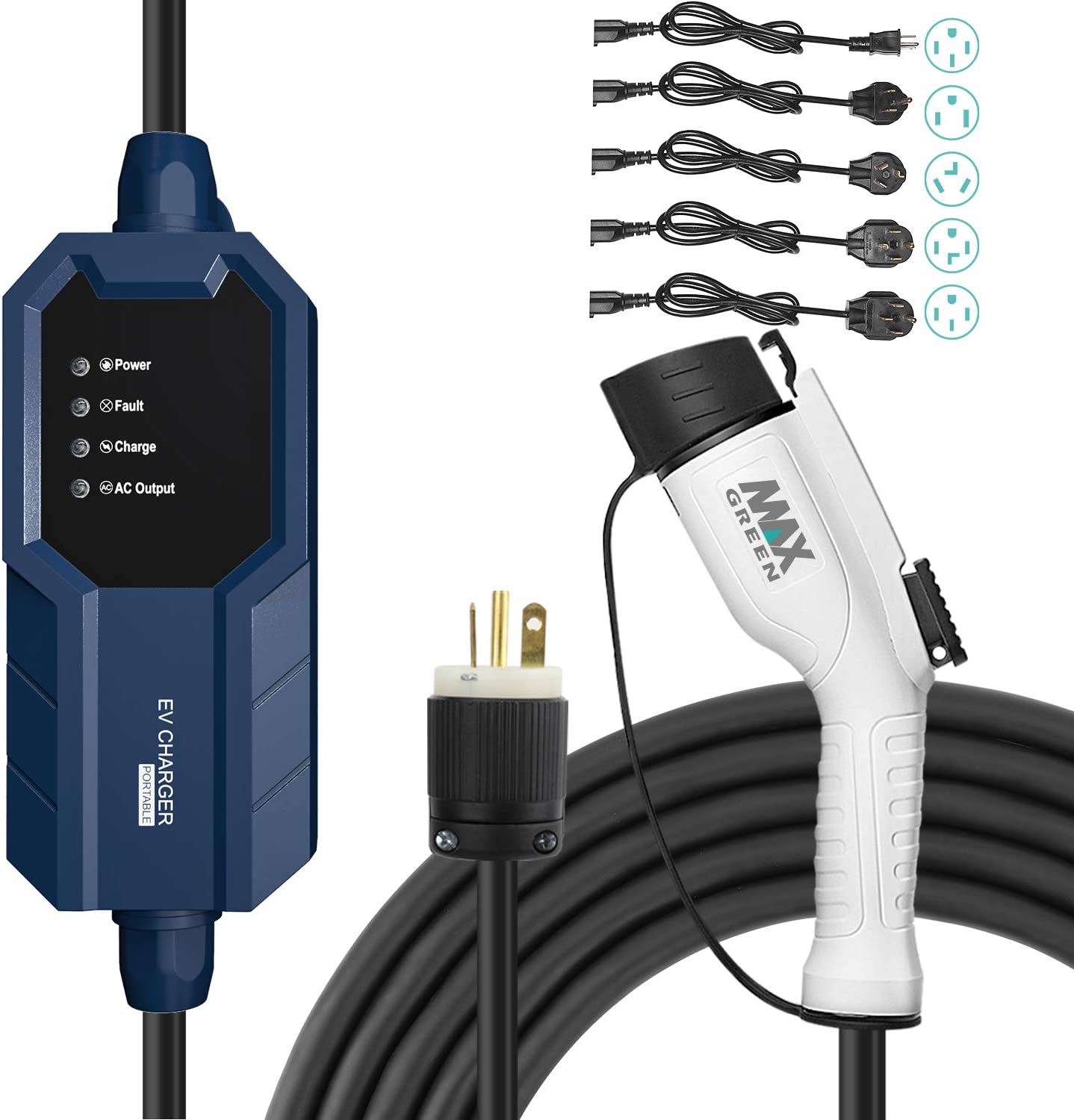
|
16 amps @ 240 volts | 15 miles per hour of charging | J1772 type 1 | 25 feet | 15.8 x 12.2 x 5.2 inches |
This luggable charging station can easily be used at home or on the road. It supports both 120 volt and 240 volt charging at up to 16 amps, 240 volts, for a maximum 3.8 kiloWatt charging rate. What makes this EVSE convenient for charging away from home is that it includes five adapters for a variety of power outlets (NEMA 10-30, NEMA 14-50, NEMA14-30, NEMA6-50 and NEMA 5-15), meaning you will have less to worry about when scrounging for a power outlet. The IP66 rated case means it can be used outdoors in the rain.
Purchase Options
Sponsored
|
|||||
|
|||||

|
16 amps @ 240 volts | 15 miles per hour of charging | J1772 type 1 | 25 feet | 16.06 x 12.32 x 4.96 inches |
This luggable charging station can easily be used at home or on the road. It comes with both a NEMA 6-20 plug (240 volt), and a NEMA 5-15 (120 volt) plug. Both are fairly common, but of course you will need adapters for other plugs. It supports both 120 volt and 240 volt charging at up to 16 amps, 240 volts, for a maximum 3.8 kiloWatt charging rate. That charge rate means 15 miles range gained per hour of charging. or 3x the rate of the standard 120 volt line charger typically sold with electric cars. The IP66 case ensures it is waterproof, allowing it to be used in the rain. While this charging station is CE certified, it does not show UL certification.
Purchase Options
Sponsored
|
|||||
|
|||||

|
16 amps @ 240 volts | 15 miles per hour of charging | J1772 type 1 | 20 feet | 9.25 x 3.5 x 2 inches |
This small and lightweight charging station can easily be used at home or on the road. With a 240 volt 16 amp charging you gain roughly 12 miles of range per hour of charging. It uses a NEMA 14-30 plug which is not all that common. You will therefore need a 14-30 outlet, and to use any other outlet will require an adapter cord. It does not operate on 120 volts.
Purchase Options
Sponsored
|
|||||
|
|||||
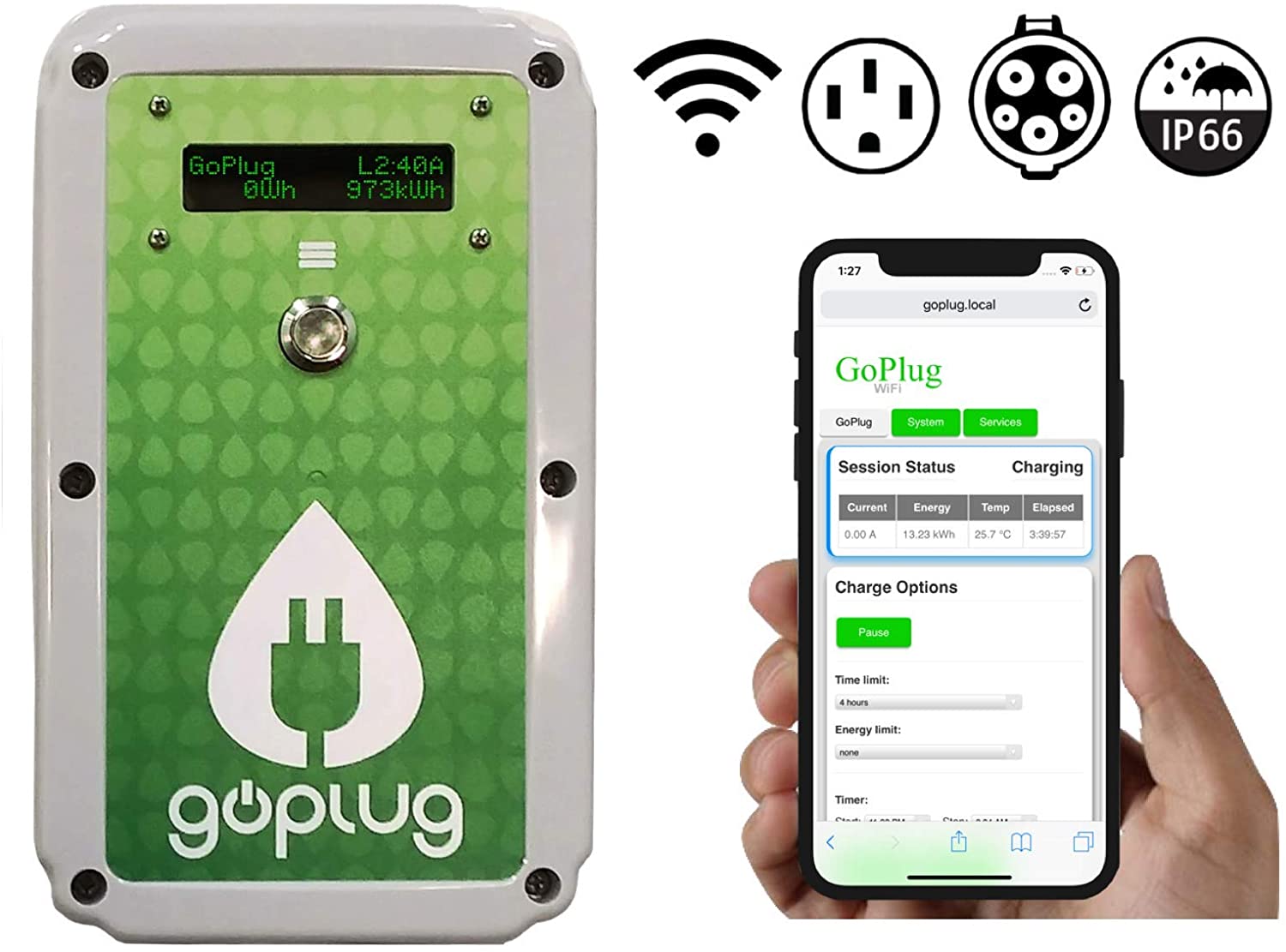
|
40 amps @ 240 volts | 100 miles per hour of charging | J1772 type 1 | 18 feet | 2.6 x 5.25 x 8.8 inches |
At 2.6 x 5.25 x 8.8 inches and 10 pounds this is a portable charging station, and its features make it very much worth the effort to use it on the road. It supports up to 40 amps charge rate, which is probably beyond the rate supported by your car. At 32 amps the rule of thumb is 20-25 miles per hour of charging, so at 40 amps (if your car supports that rate) you would gain close to 30 miles per hour of charging. The charger supports many settings that can be changed relatively easy through a button and display on the front panel. This includes adjusting the charging rate as needed. It can be configured/controlled via a local WiFi connection. It has a NEMA 14-50 connector, and can run on any voltage from 90 volts to 264 volts. To support other power outlets require adapters that are easy to build. It is based on the OpenEVSE design, an open source charging station, making it possible to reprogram by flashing new firmware if you are the correct sort of geek.
Purchase Options
Sponsored
|
|||||
|
|||||

|
32 amps @ 240 volts | 25 miles per hour of charging | J1772 type 1 | 18 feet | 11.8 x 5.5 x 4.4 inches |
At 11.8 x 5.5 x 4.4 inches and 10 pounds this is a portable charging station, and its features make it very much worth the effort to use it on the road. It supports up to 32 amps charge rate, for which the rule of thumb is 20-25 miles per hour of charging. The charger supports many settings that can be changed relatively easy through a button and display on the front panel. This includes adjusting the charging rate as needed. It can be configured/controlled via a local WiFi connection. It has a NEMA 14-50 connector, and can run on any voltage from 90 volts to 264 volts. To support other power outlets require adapters that are easy to build. It is based on the OpenEVSE design, an open source charging station, making it possible to reprogram by flashing new firmware if you are the correct sort of geek.
Purchase Options
Sponsored
|
|||||
|
|||||

|
24 amps @ 240 volts | 25 miles per hour of charging | J1772 type 1 | 18 feet | 11.8 x 5.5 x 4.4 inches |
The Evr-Green Mini is a highly portable charging station that's very useful both at home or on the road. Its size is about the same size as the typical line cord charger, but it supports a 5.7 kiloWatt (24 amp) charging rate. Between the small size and the useful power level, this is close to the perfect portable charging station. It comes with a NEMA 6-30 plug attached to the end of the cord, so make sure you get or build appropriate adapters.
Purchase Options
Sponsored
|
|||||
|
|||||

|
20 amps @ 240 volts | 17 miles per hour of charging | J1772 type 1 | 25 feet | 4 x 3 x 11 inches |
This charging station is very portable making it easy to use both at home and on the road. The 3 kiloWatt charging rate is an excellent choice for home charging, being 2-3 times faster than the charging speed at 120 volts. While away from home that charging speed may be too slow to be of practical use, but 3 kiloWatts is better than 0 kiloWatts or 1 kiloWatts. That it runs solely at 240 volts means it is less flexible than other compact EVSE's which support 120 volts. The LCS-20P comes fitted with a NEMA 14-50P Plug meaning that you'll need an adapter cord for any common 20 amp outlets like the NEMA 6-20. Clipper Creek is a highly recommended company with over a decade of experience building charging stations.
Purchase Options
Sponsored
|
|||||
|
|||||

|
32 amps @ 240 volts 3-phase | 28 miles per hour of charging | IEC 62196-2 (Mennekes, Type 2) | 5 meters | |
This portable charging station handles 3 phase AC charging at up to 7 kiloWatts. It connects to a normal CEE 32A 3-phase AC power outlet, and then connects to the car using the normal IEC Type 2 plug. The company also makes a version with an SAE Type 1 plug, and also versions that handle 11 kiloWatts. The charging rate can be adjusted to 10 Amps, 16 Amps, 20 Amps, 24 Amps, or 32 Amps. This is done by pressing a button after turning on the unit. Included with this charging station is a pair of RFID cards, one of which is used for adjusting the charging rate, the other is used to set a timer to delay the start of charging. The unit is only rated for dust and moisture resistence up to IP54. This is not very resistent, and therefore it is not recommended to use this in rainy conditions. Purchase Options
Sponsored
|
|||||
|
|||||

|
13 amps @ 240 volts | 15 miles per hour of charging | IEC 62196-2 (Mennekes, Type 2) | 7 meters | |
This portable charging station handles AC charging at up to 13 Amps. It connects to a normal 3-pin AC power outlet that's common in the United Kingdom. The company also makes a version with the Europlug for use in the rest of Europe. It comes with a 6.5 meter charging lead which has the normal IEC Type 2 plug. To use this with a car that has an IEC Type 1 plug requires a Type 1 to Type 2 adapter. The charging rate can be adjusted to 8 Amps, 10 Amps, or 13 Amps. This is done by pressing a button after turning on the unit. The unit is only rated for dust and moisture resistence up to IP65. This is very resistent, and it be used in rainy conditions. Purchase Options
Sponsored
|
|||||
|
|||||

|
16 amps @ 240 volts | 15 miles per hour of charging | IEC 62196-2 (Mennekes, Type 2) | 5 meters | |
This portable charging station handles AC charging at up to 16 Amps. It connects to a normal Schuko AC power outlet that's common in Europe. It comes with a 5 meter charging lead which has the normal IEC Type 2 plug. To use this with a car that has an IEC Type 1 plug requires a Type 1 to Type 2 adapter. The unit is rated for dust and moisture resistence up to IP66. This is very resistent, and it be used in rainy conditions. Pay attention to the product description, because on Amazon it is claimed this EVSE supports 7kW charging. Because it only handles 16 Amps, at 220 or 240 volts that's barely 3 kiloWatts. For this EVSE to handle 7 kW, it would have to handle 32 Amps, which it does not. This particular unit does not have circuitry in a case. There is a pricier version which has a case built onto the cord, and the case has an information display. Purchase Options
Sponsored
|
|||||
|
|||||

|
16 amps @ 240 volts | 15 miles per hour of charging | IEC 62196-2 (Mennekes, Type 2) | 5 meters | |
This portable charging station handles AC charging at up to 16 Amps. It connects to a normal CEE AC power outlet that's common in Europe. It comes with a 5 meter charging lead which has the normal IEC Type 2 plug. To use this with a car that has an IEC Type 1 plug requires a Type 1 to Type 2 adapter. The charging rate is adjustable for 8 Amps, 10 Amps, 13 Amps, or 16 Amps by pressing a button after turning it on. There is an information display showing current charging statistics. It comes with a carrying case, and is small enough to be carried full time in the car. The unit is only rated for dust and moisture resistence up to IP55. This is not resistent, and it is best to use this indoors, and to avoid using it in rainy conditions. Purchase Options
Sponsored
|
|||||
|
|||||

|
16 amps @ 240 volts | 15 miles per hour of charging | IEC 62196-2 (Mennekes, Type 2) | 7 meters | |
This portable charging station handles AC charging at up to 16 Amps. It connects to a normal CEE AC power outlet that's common in Europe. It comes with a 5 meter charging lead which has the normal IEC Type 2 plug. To use this with a car that has an IEC Type 1 plug requires a Type 1 to Type 2 adapter. The charging rate is adjustable for 6 Amps, 8 Amps, 10 Amps, or 13 Amps by pressing a button after turning it on. It comes with a carrying case, and is small enough to be carried full time in the car. The unit is only rated for dust and moisture resistence up to IP66. This is weather-resistent, and it can be used in rainy conditions. Purchase Options
Sponsored
|
|||||


